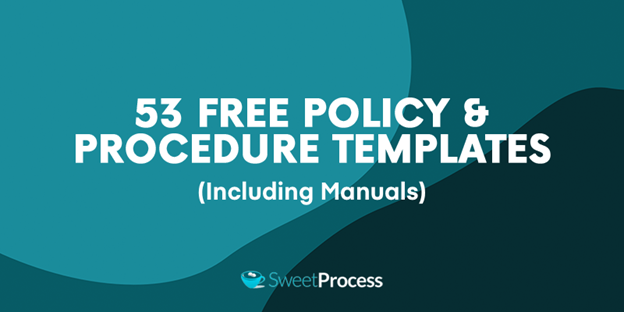

Every business that does its activities without a clear pathway will struggle to grow. Their employees wouldn’t know the right method to get things done.
That’s why in your organization, you should have a document that clearly shows how employees, by role and department, undertake their tasks and work effectively with other departments.
These footstep documents will typically cover your company’s rules and employee guidelines to ensure that employees deliver services effectively to your clients.
In this guide, I will share the 53 free policy and procedure templates that you can seamlessly adapt to create these documents from the ground up to the implementation. They are presented by industries and categories for easy scan and identification.
Without further ado, let’s hit the ground running.
Below are the 53 free policy and procedure templates that you can use in your company. Let’s go through them one after the other.
The general office policy and procedure document are documents ranging from human resources, business and workplace administration, regulations, employee welfare, etc.
These documents guide the hiring process, employee communication, customer interaction, and service delivery, etc. Below are some templates in this section:
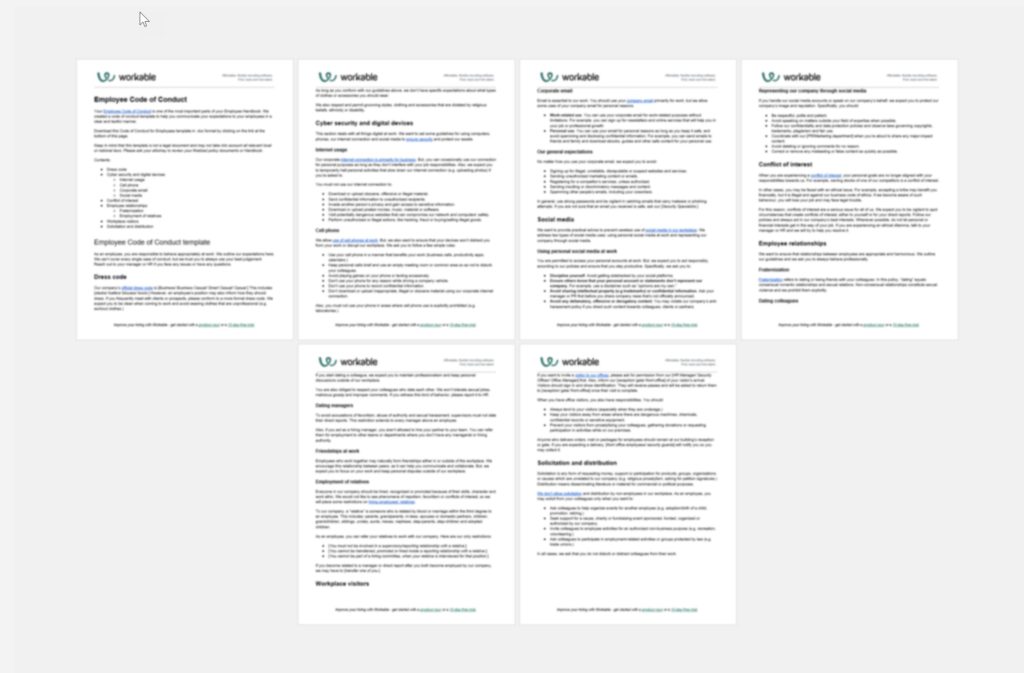
The employee code of conduct template will help you to communicate your expectations to your employees clearly and tactfully. It presents to your employee the responsibilities and roles required of them to play and how you want them to deliver it on their respective tasks.
If created and implemented the right way, it will ensure that you don’t have any issues with your employees because expectations would be aligned.
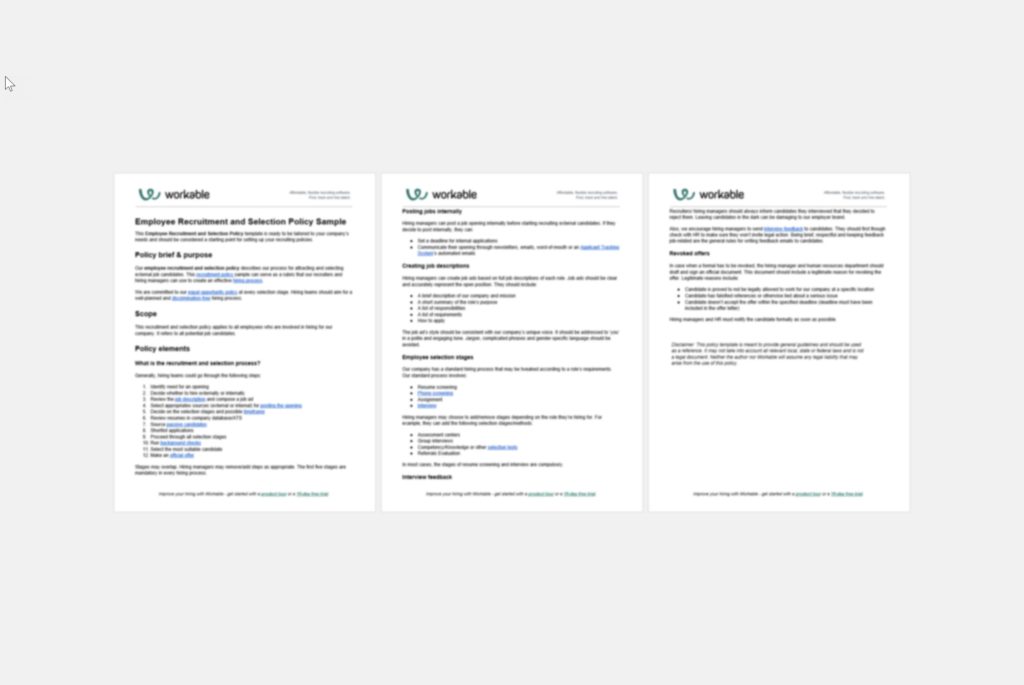
This Employee Recruitment and Selection Policy template will help you to create a tailored process for setting up your recruiting policies.
It will guide you to understand what to put in place and why you should make them available to attract the right talents and make plans for their long-term stay at your company.

It is important to protect your company from data theft.
By ensuring that every staff member has the firm’s policy regarding the acceptable use of IT resources, particularly internet, email access, and data protection policies, you let employees understand their use of devices in the organization.
This template will help you create the internet and email policy from the ground up, and you can also add a section for Bring Your Own Device (BYOD) policy that will cover the use of personal devices and the extent of permission they get to connect with the information systems.
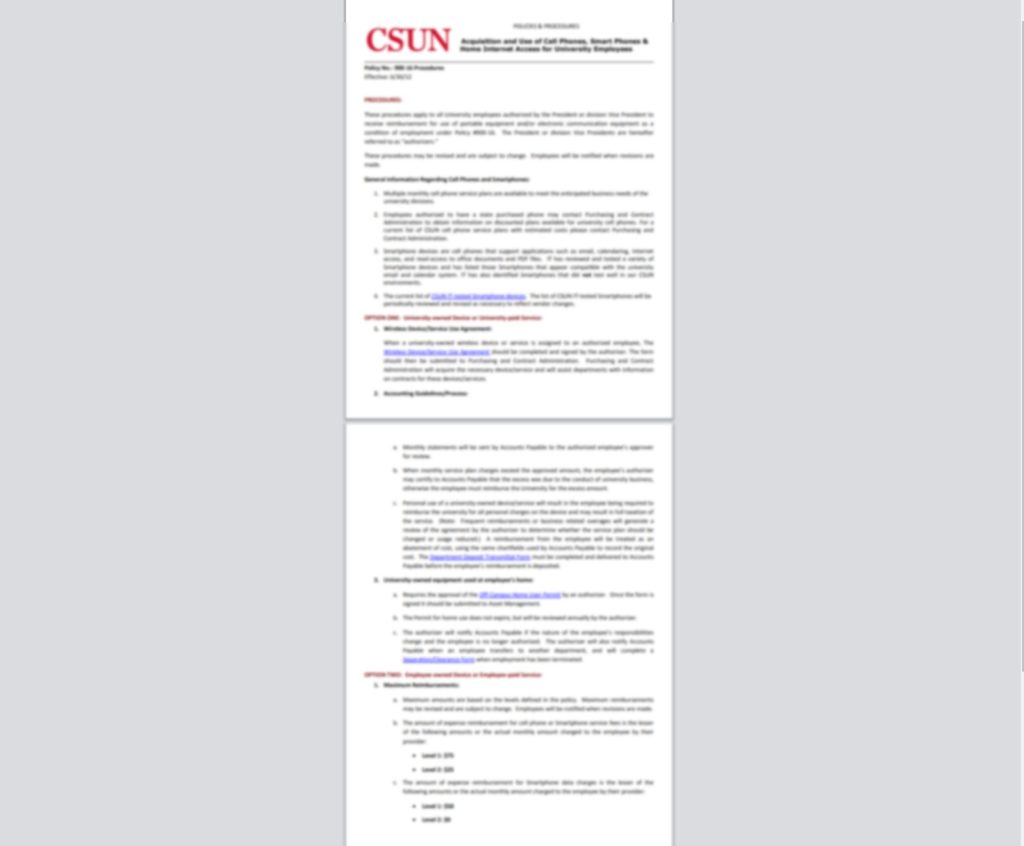
Have you witnessed a customer service agent telling a customer to hold on all because he wants to make a call on his personal phone? That shouldn’t happen when you’re at work.
This mobile phone policy and procedure template will show your employers how personal phones should be used during work hours. It includes the type of device you should use to make or receive phone calls, leave messages, send text messages, etc. Also, it will specifically mention when personal calls should be done in dire need.
This policy is also referred to as a no-mobile-phones-at-work policy.
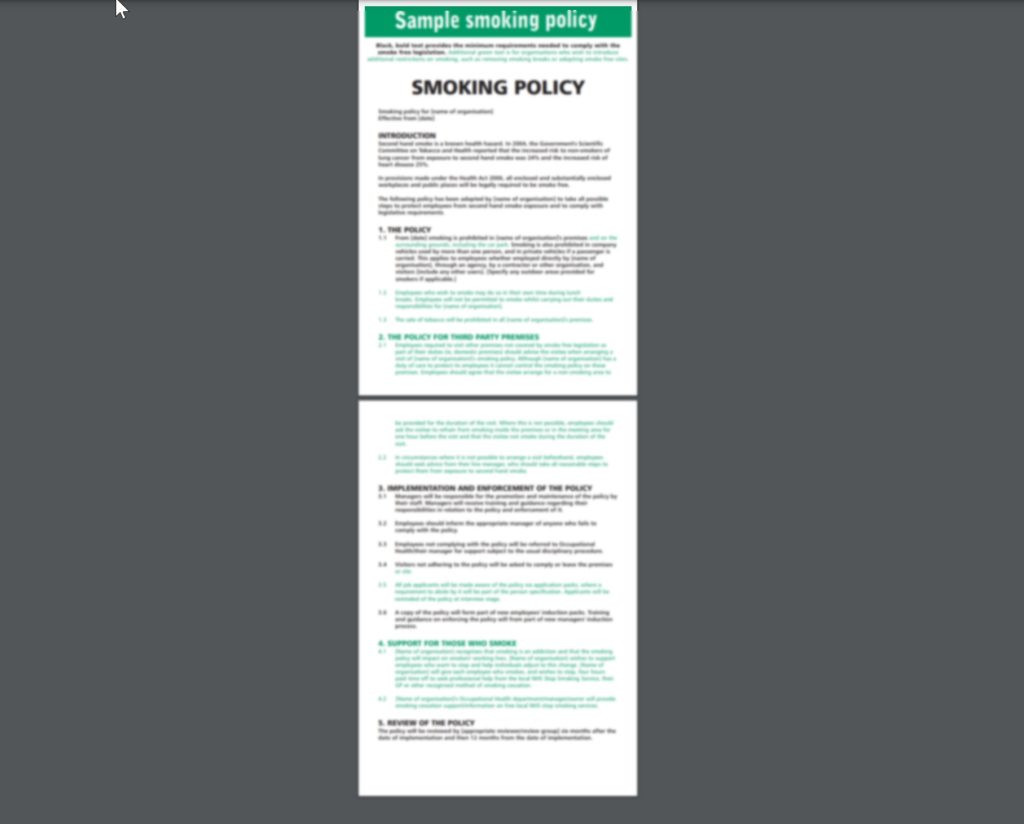
The Non-smoking Policy and Procedure template aims to protect all staff members—both smokers and non-smokers, and company visitors or customers. It also ensures that everyone is kept abreast of the harmful effects of tobacco smoke and that everyone understands their rights and responsibilities as it complies with the organizational policies of employee welfare.
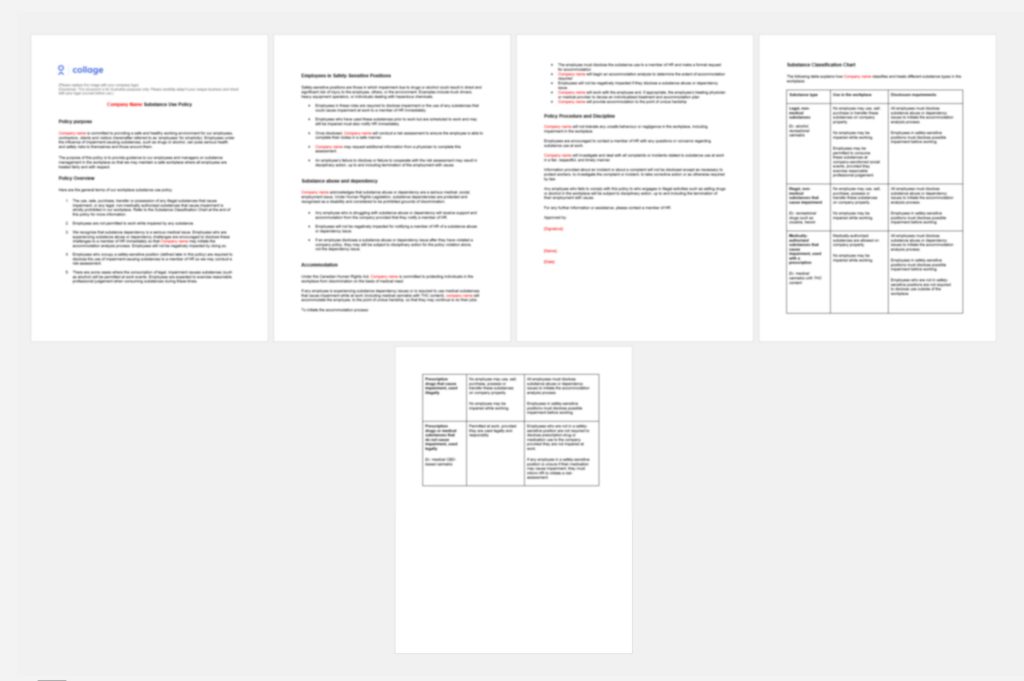
The purpose of this policy is to provide clear guidelines to employees and managers on substance management in the workplace so that you maintain a safe workplace where all employees are treated fairly and with respect. This template gives you a direction you can follow when creating one for your company.
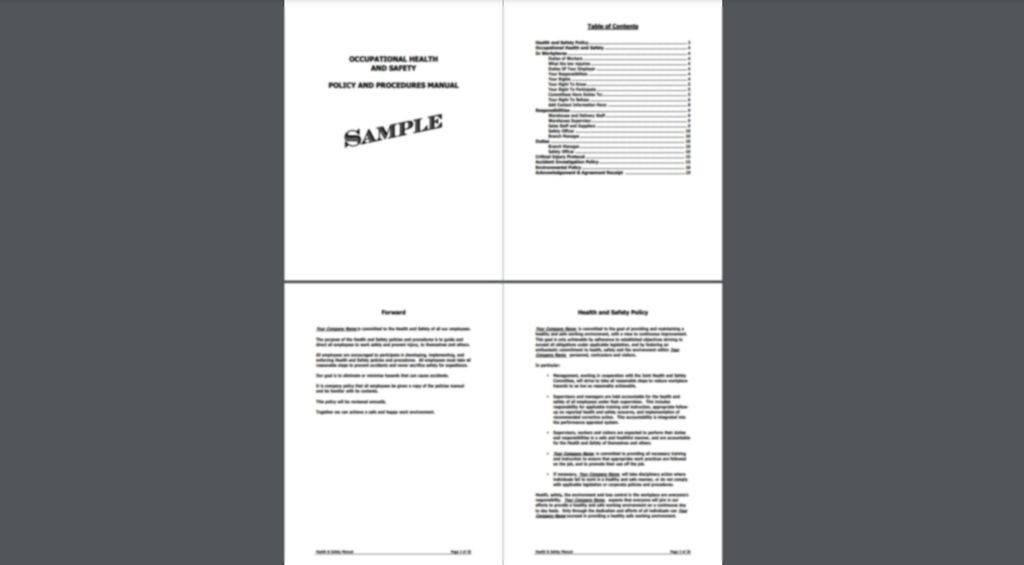
The Health and Safety Policy and Procedure document integrates workplace health and safety into all aspects of your company operations. This includes tactics for identifying hazards, assessing risk, and implementing control strategies.
The goal is to minimize the risk of injury to people and property and ensure that relevant health and safety laws that apply to working conditions and the work environment are observed and enforced.
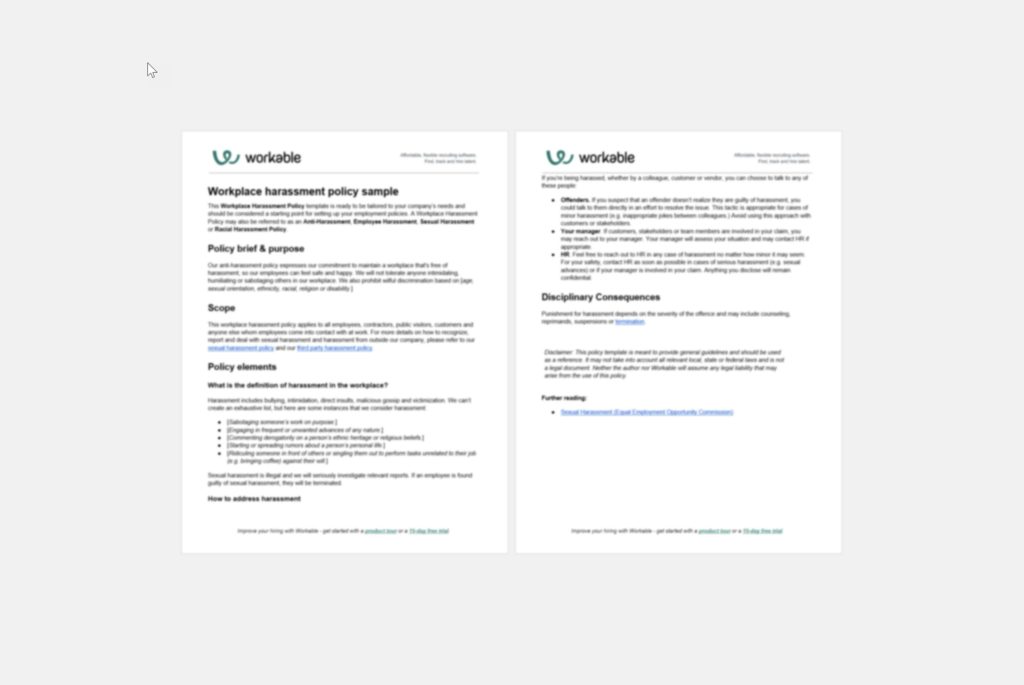
This Anti-discrimination and Harassment Policy and Procedure document imposes on every company and its employers to respect the differences, i.e., race, color, creed, and beliefs of their colleagues.
Also, it adds that employee’s employment, recruitment and selection, conditions and benefits, training and promotion, task allocation, shifts, hours, leave arrangements, workload, equipment and transport, etc., should be as agreed from the initiation of the contract.
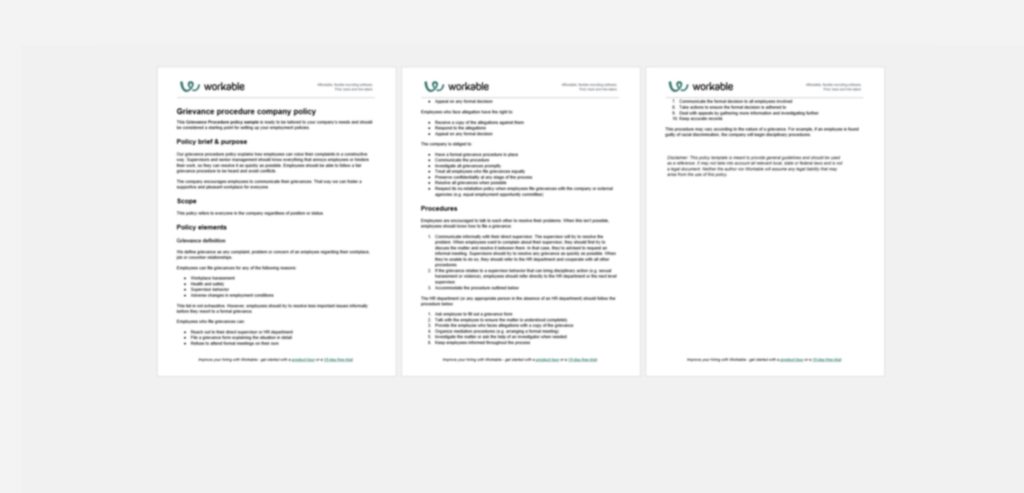
This Grievance Policy and Procedure document highlights how employees can constructively voice their complaints. It also shows C-suite executives and supervisors how to identify every instance that annoys employees or could prevent a proper workflow so that a resolution can be made as fast as possible.
It creates room for employees to communicate their grievances so that they can create a supportive and pleasant workplace.
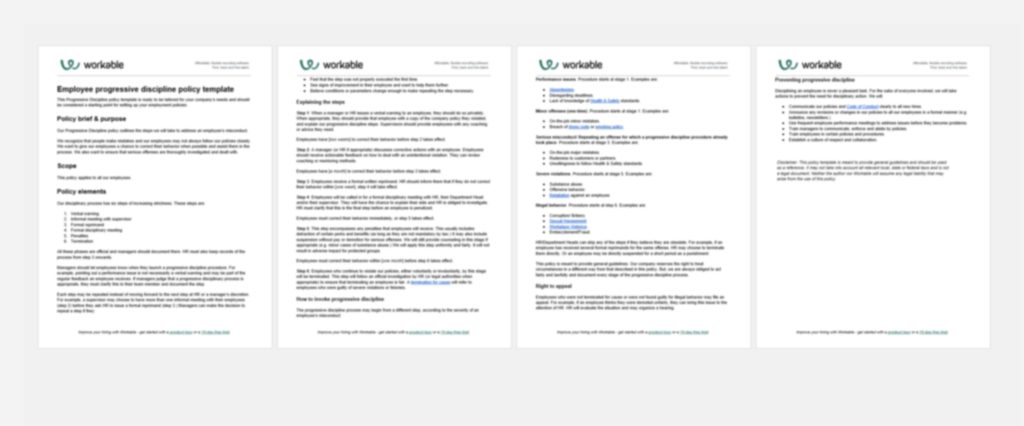
Employee termination is an uncomfortable situation to deal with. This policy and procedure document sets out to regulate and provide directions on how disciplinary measures are carried out and employee termination is done. It covers each step of the discipline and termination process.
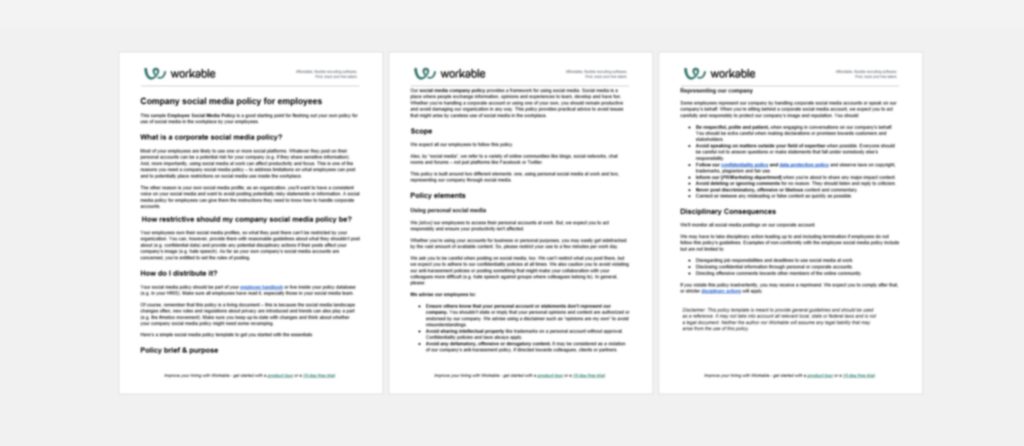
Every employee is an ambassador of the organization. So what you say or do on social media must align with the principles and values of the organization.
The Social Media Policy and Procedure document template guides employees’ and employers’ use of social media.
This includes how you write content on different channels such as blogs, wikis, microblogs, message boards, chat rooms, electronic newsletters, online forums, social networking sites, etc.
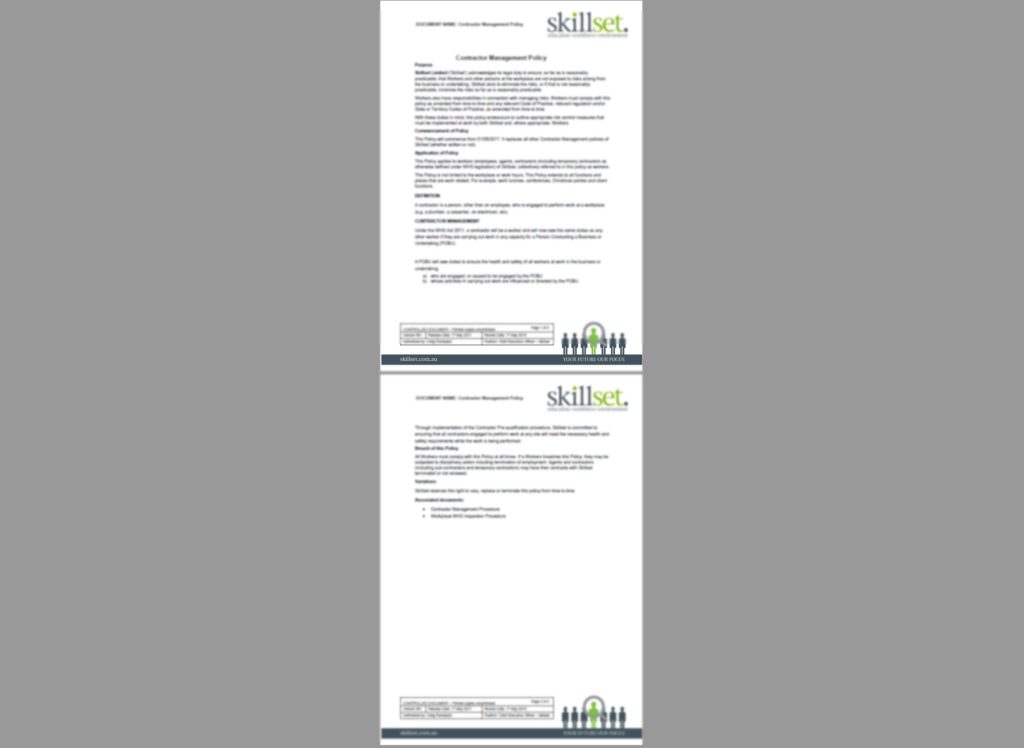
The Contractors’ Policy and Procedure template defines how a contractor behaves with your company. It highlights the competence of the individual and the project they’ve been appointed to complete.
Also, it identifies where they can visit in the organization and the out-of-normal-hours communications they are allowed to make.
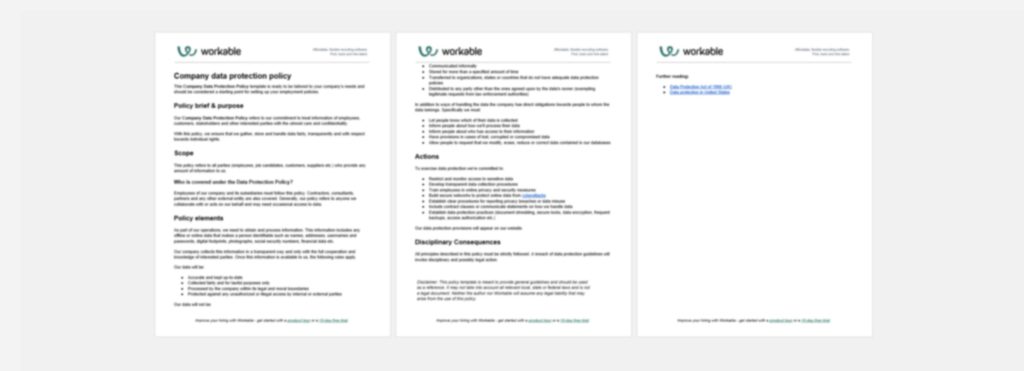
This company data protection policy and procedure template provides you with the guidelines to secure data that is critical to your businesses. Also, it provides the steps you need to do this from the areas of the users by drafting a clear and concise privacy policy agreement.
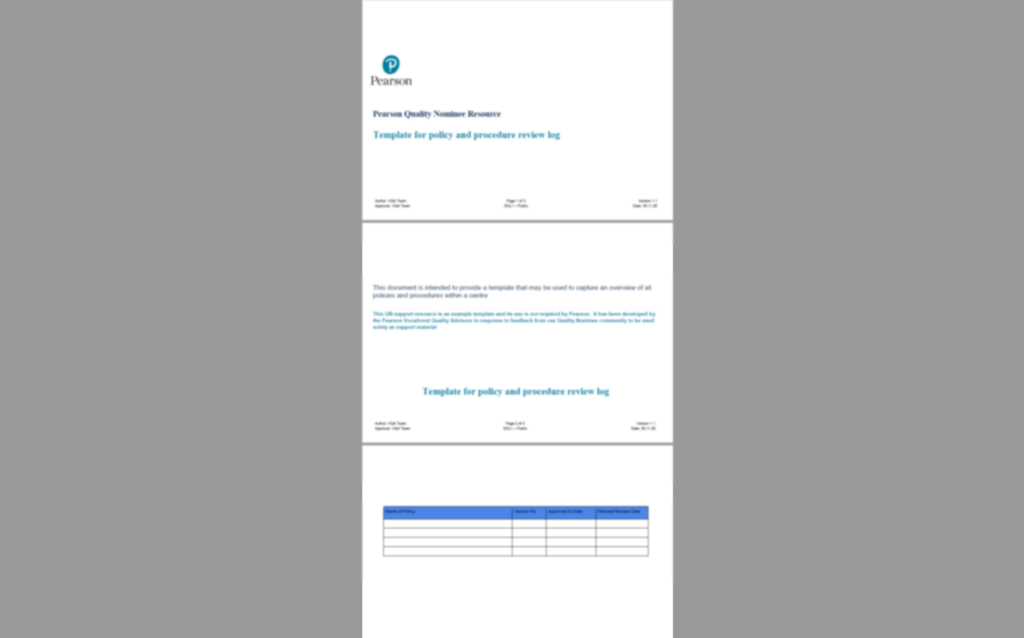
Quality assurance is important for all businesses. Many smart businesses thrive because their customers are well aware of the quality products they produce.
This is a quality nominee policy and procedure document that you use to create a roadmap for growing your consumer base.
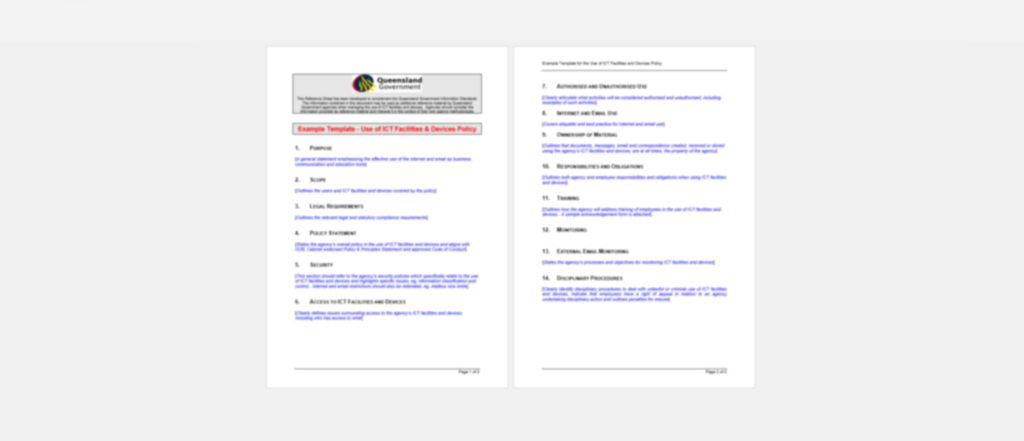
These ICT Facility Use Policy and Procedure documents provide guidelines for the acceptable standard for your employee’s appropriate use of ICT facilities such as computing and networking resources.
These documents will provide the appropriate ICT resources and encourage users to understand their rights and responsibility in protecting the company’s facilities.
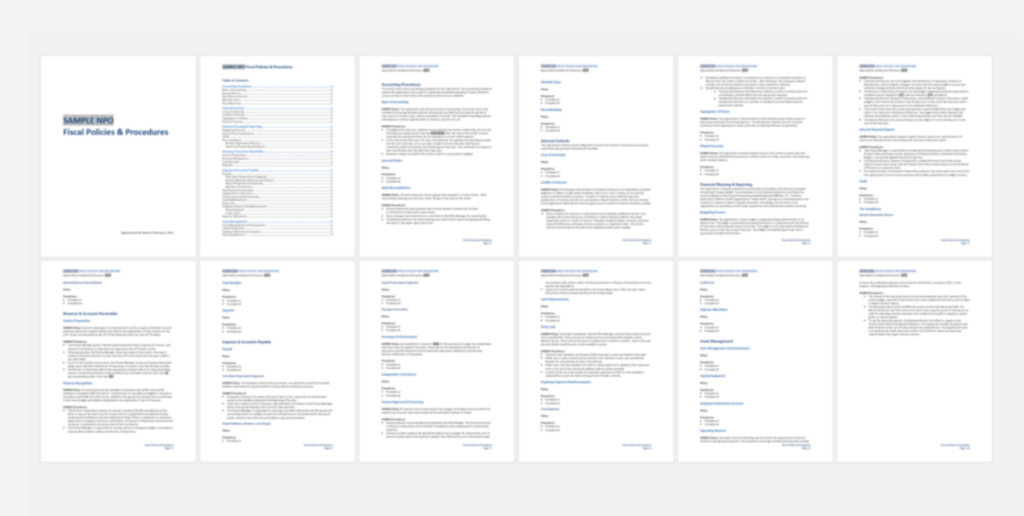
The fiscal policy and procedure templates embody the organization’s policy which influences the changes in the company’s spending or taxes. It is financial information that clarifies the roles, authority, and responsibilities of your company and employees in their handling of essential financial management tasks and activities.
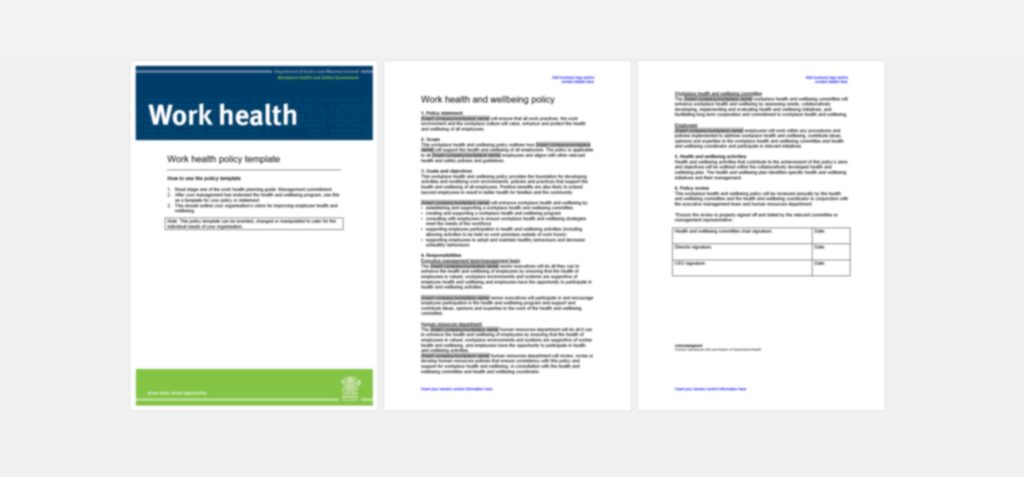
The Employee Health Policy and Procedure template outlines your organization’s vision of improving your employee’s health.
It also includes the type of health package, the number of days an employee can take for sick leave, and the benefits entitled to an employee with chronic ailments, etc.
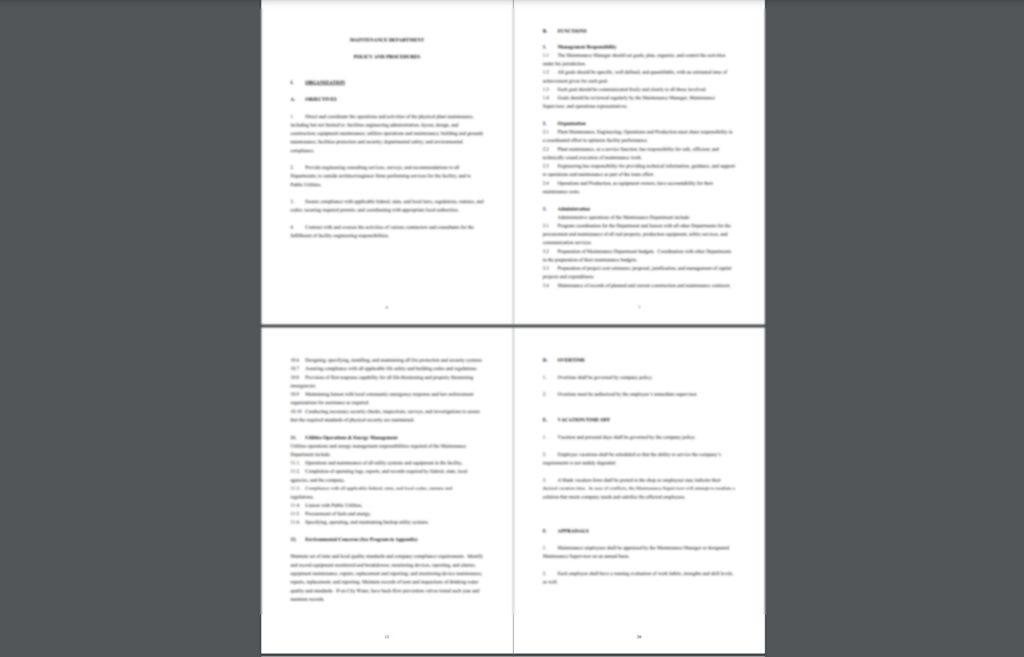
The office maintenance policy and procedure document comprises the administrative operations of maintaining the workplace. This template coordinates each maintenance program and reveals how it liaises with other departments.
It also involves the procurements and maintenance of all the real property, production equipment, utility services, communication services, and other assets that are present in the office.
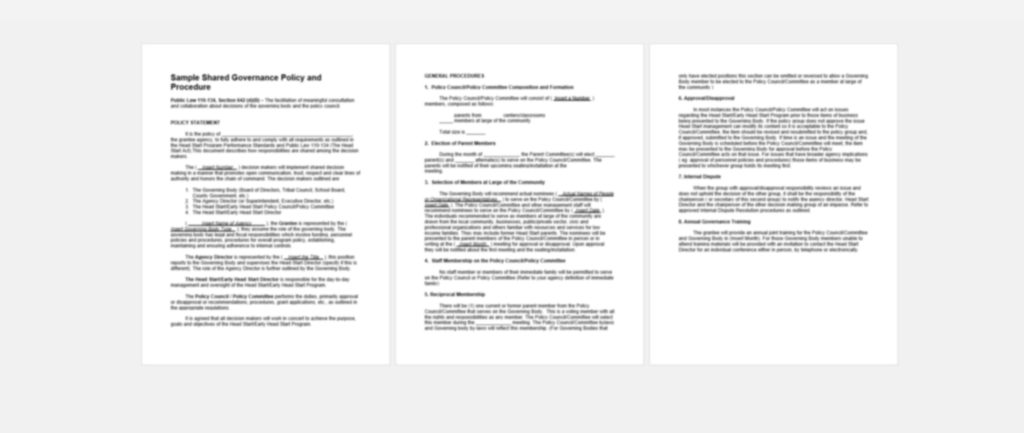
The Shared Governance Policy and Procedure template consists of the basic rules that govern the specific internal affairs of the organization. It entails the team that provides governance that is shared between multiple business units or functions.
It also includes the corporate charter that identifies with the affairs of decision-making through a democratic process.
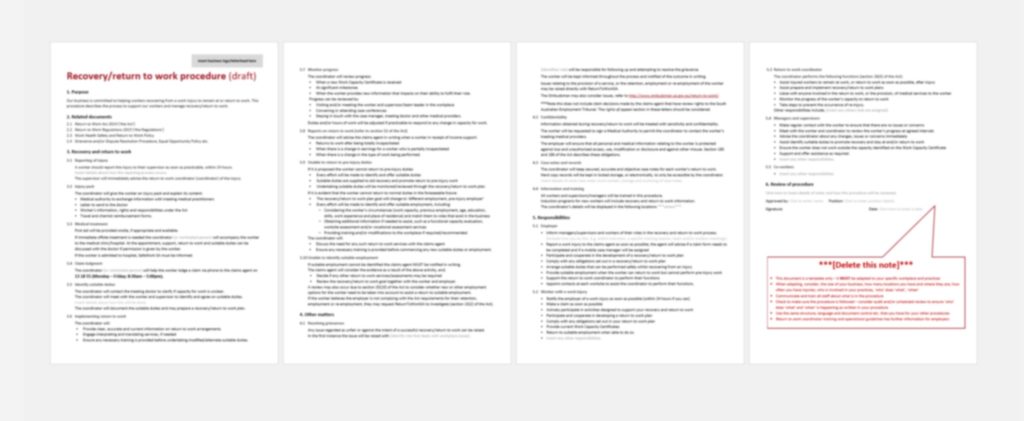
Within or outside the workplace, accidents can happen. This unplanned event disrupts normal work activities.
The Return to Work Policy and Procedure template highlights how accidents are reported, the medical procedure that it passes through, and how the emergency responses are followed.
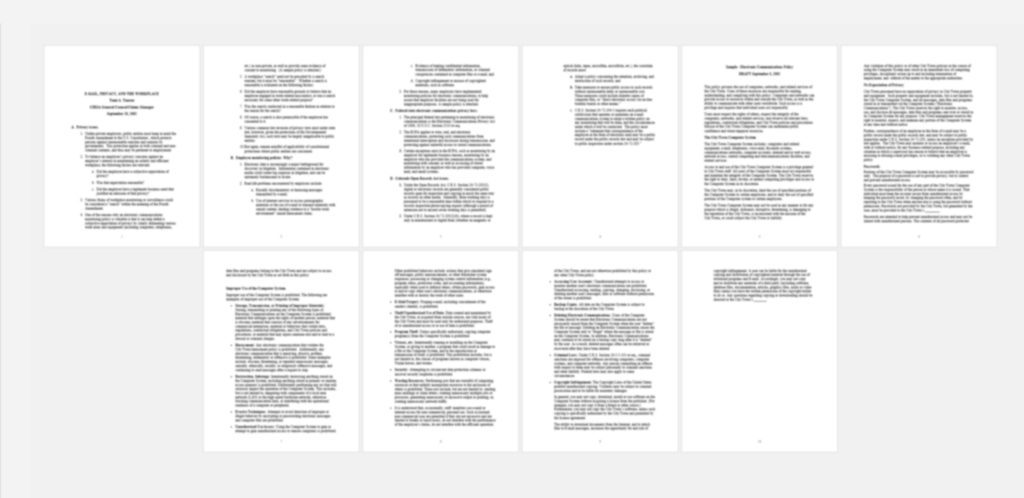
The Electronic Communication Policy and Procedure template emphasizes the responsible use of electronic tools.
It highlights that electronic communication should be utilized in a professional and legal way and that doesn’t compromise the confidentiality of proprietary or other sensitive information.
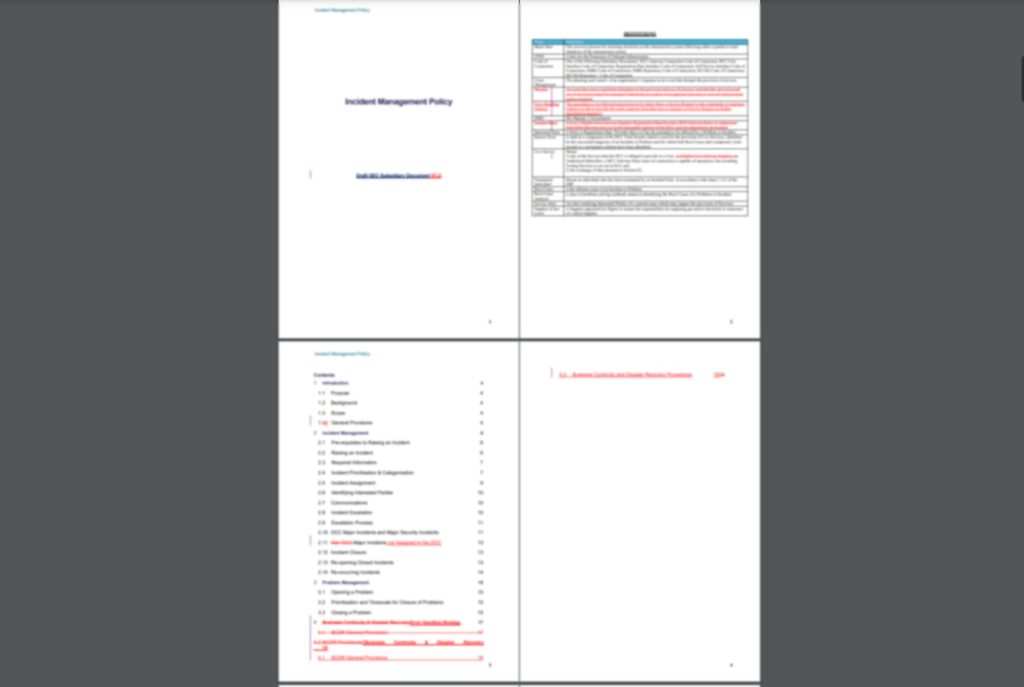
The Incident Management Policy and Procedure template guides actions that enable the response to a major incident or disaster. It achieves this by implementing a plan to restore the critical business functions of the organization when the incident happens. It is like a plan B document that works during process emergencies.
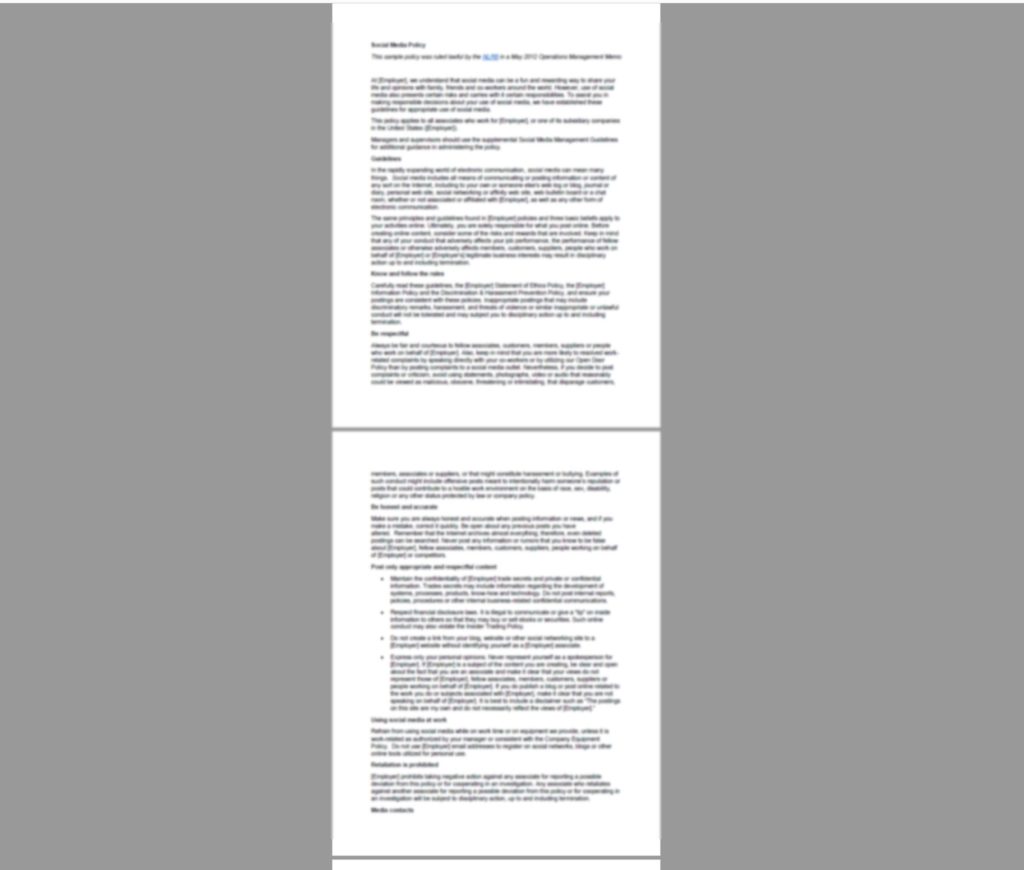
The Social Networking or Social Media Policy and Procedure template ensures that some level of specific risks is considered before posting, and excellent response management is in place should your audience post derailing comments.
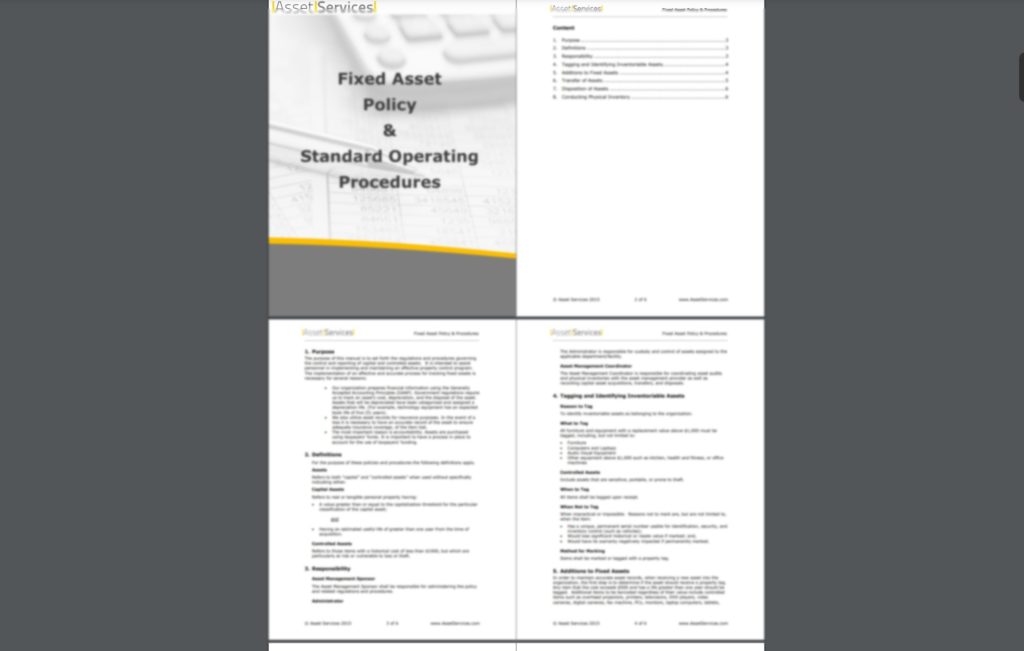
The Fixed Asset Policy and Procedure template covers the company’s properties that cannot easily be converted into cash, such as land, buildings, and machinery.
It provides a solid and complete asset management strategy that points employees and employers in the right direction when making decisions about assets.
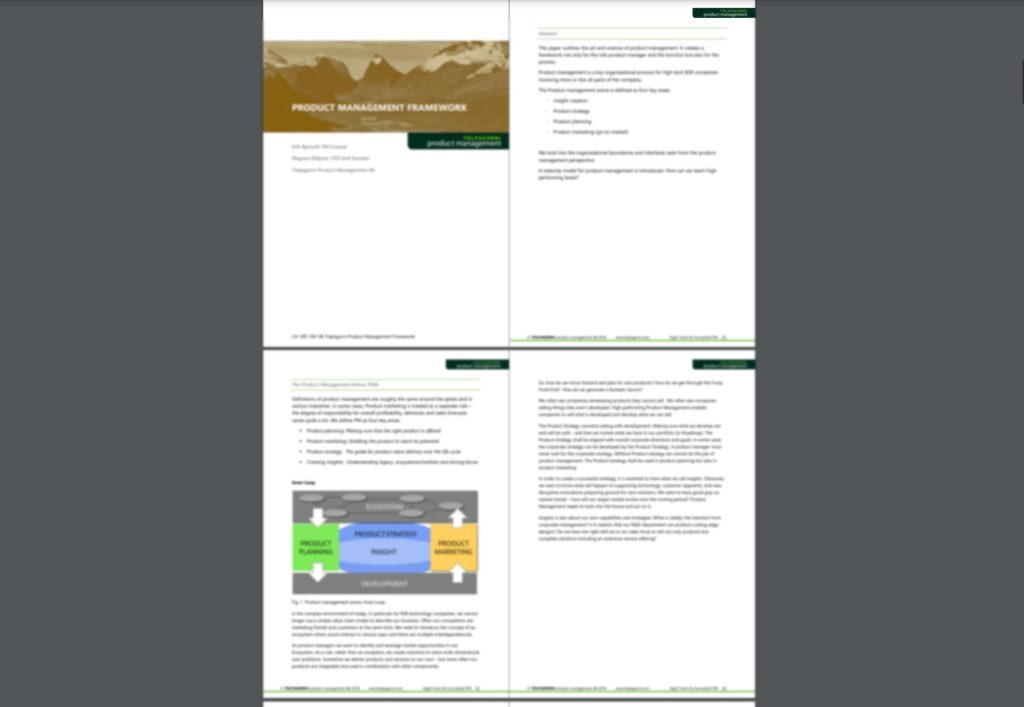
The Product Management Policy and Procedure template helps you fill the missing link between the product ideation, user story, product design, development, implementation, and testing.
It creates a synergy between the data, design, and software development departments to ensure that products are well designed, produced, delivered, and supported for organization quality and customer satisfaction.

The Market Research Policy and Procedure template highlights the important information about your company’s market research.
It captures the research commencement date, the timeline, budget, methodology, process, and the desired outcomes from the project. It also doubles as a tool for receiving quicker sign-off from management when embarking on a new venture.
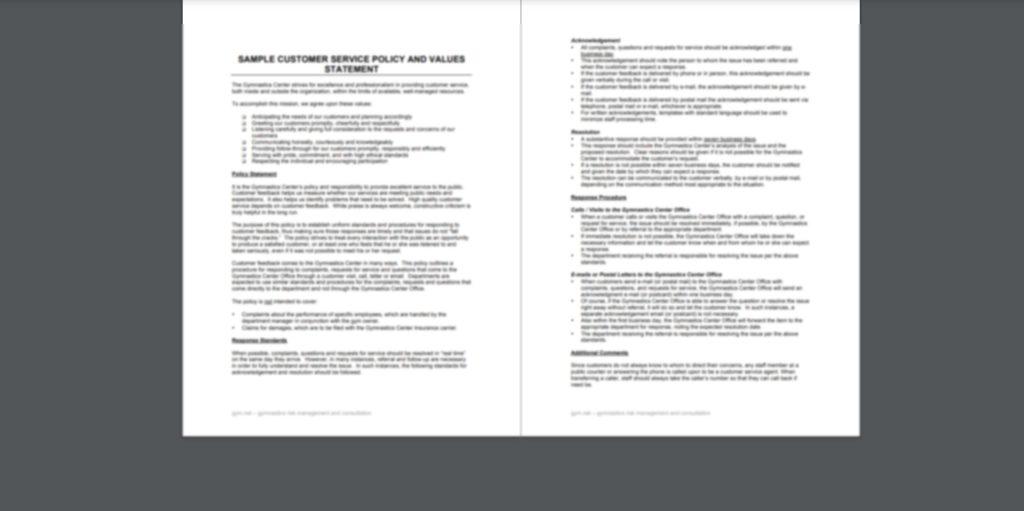
The Customer Service Policy and Procedure template helps you deliver excellent services to your customers.
It includes the etiquette and processes that the customer services representative of a business or company must follow while dealing with customers to resolve their queries.
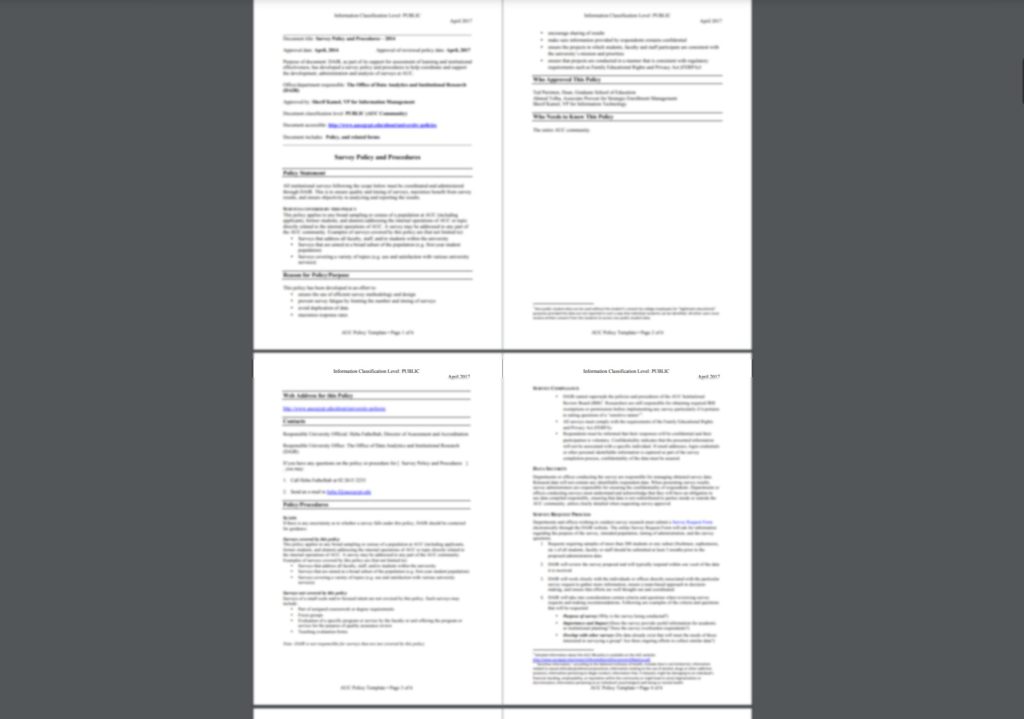
The Customer Satisfaction Survey Policy and Procedure template helps you gather data to inform the direction of decision-making in your business. It also helps you to know what customers think about your business so that you tweak your system to improve satisfaction and overall performance.
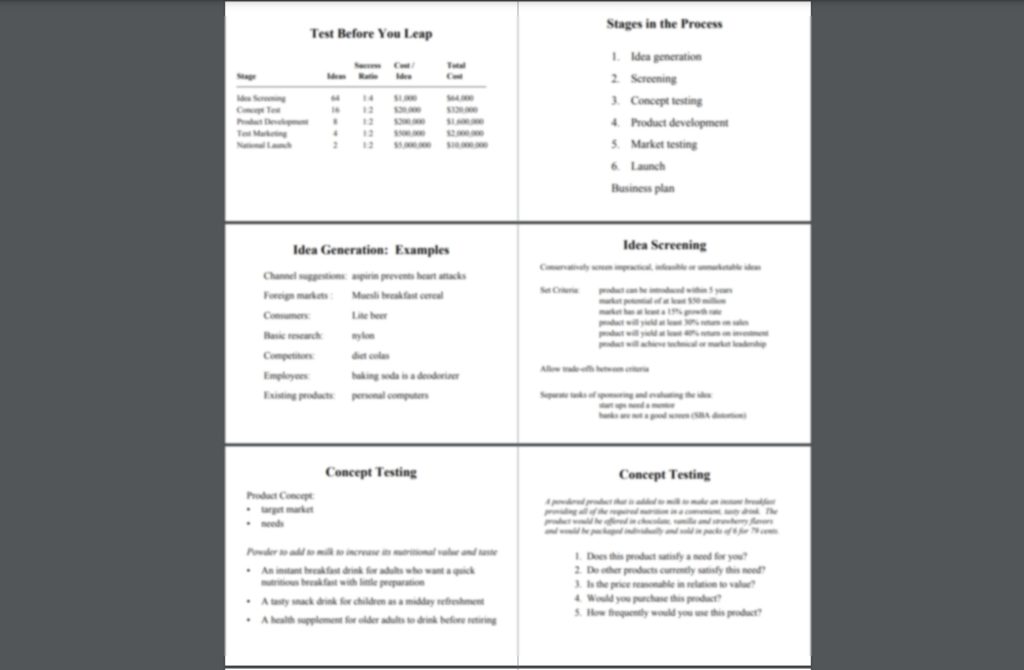
The Product Development Policy and Procedure template defines the approved methods that your organization adopts for planning, design, and development of your company’s new products or services to ensure quality, safety, and reliability.
This is crucial for adequate planning and to ensure that controls are established, implemented, and maintained during the design phase to optimize quality, effectiveness, safety, and customer satisfaction before manufacturing the new products.
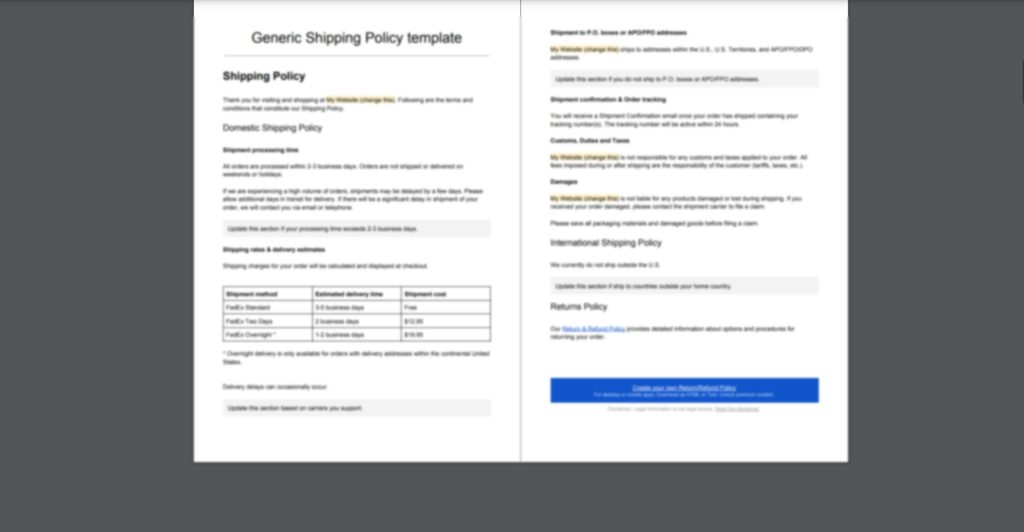
The Product Shipping Policy and Procedure template outlines the important information around shipping products when an order is placed online. It shows how specific orders are packaged, the details on shipping costs and methods, delivery times, etc.
It also includes a means of tracking orders, so customers don’t raise unnecessary alarms due to inadequate information.
The medical industry policy and procedure templates are documents ranging from home care, infection control, overdose prevention, parental issues and concerns, sickbay, etc.
These policy and procedure templates guide personal and workplace hygiene, improve immunity against diseases, and protect the rights of children and young people. Below are some templates in this section:
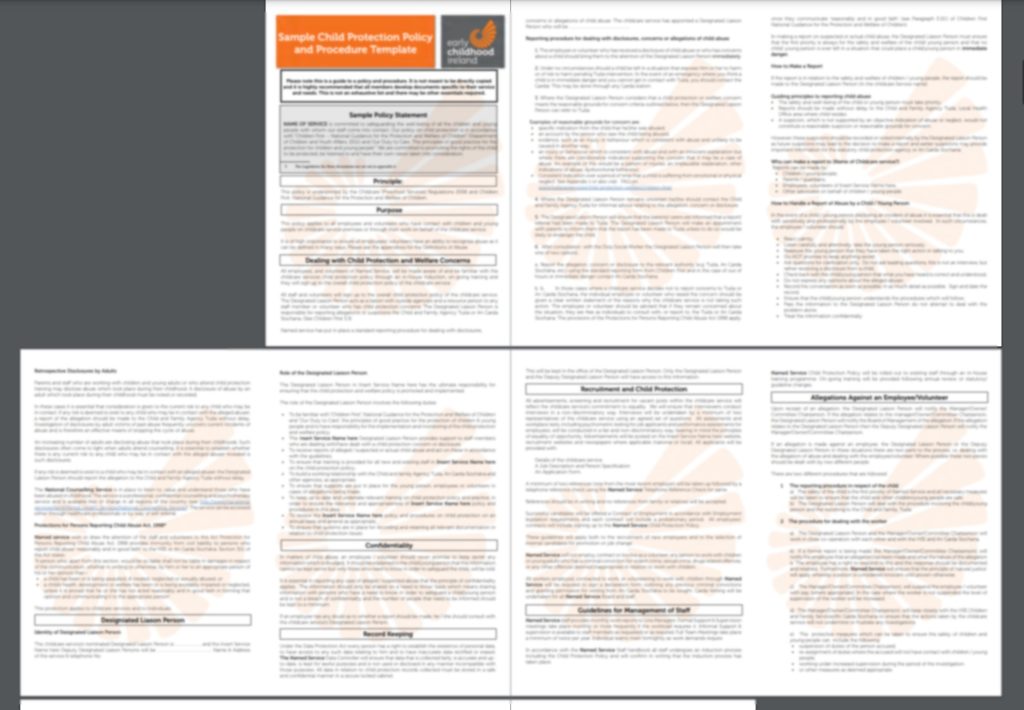
The Child Protection Policy and Procedure template provides information that safeguards the welfare of all children in an organization’s care.
It outlines your company’s commitment to protecting children, highlights your tolerance to embracing difference, diversity and respects the rights of children and young people.
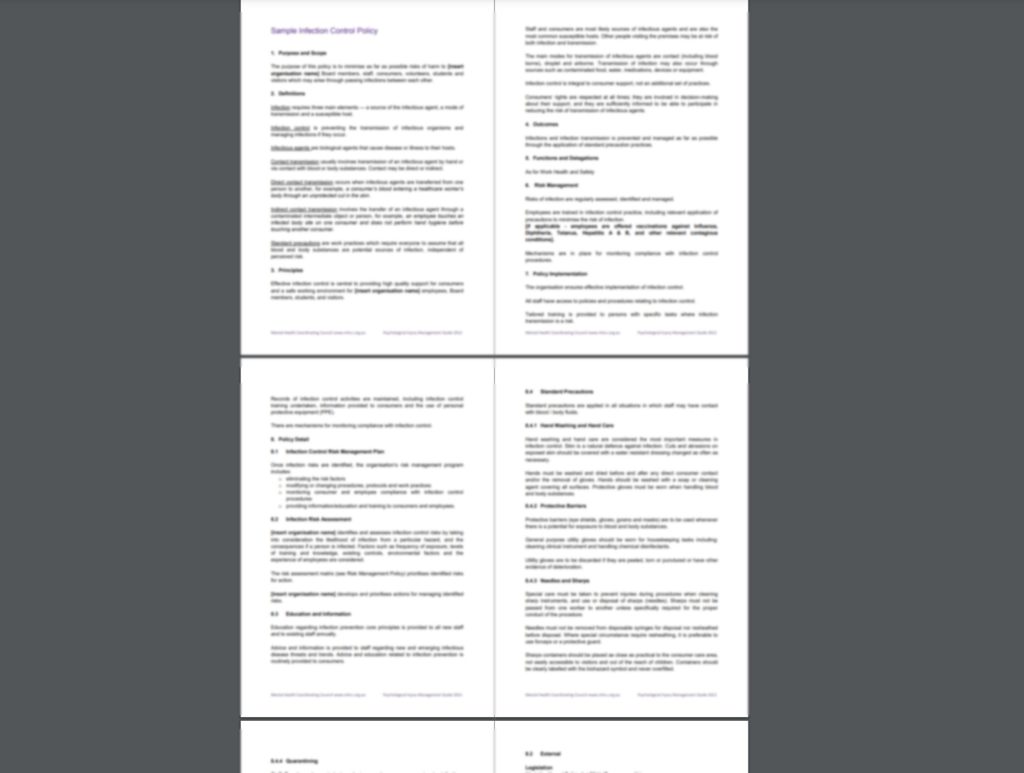
The Infection Control Policy and Procedure template provides guidelines for professional hygiene standards required to avoid infection transmission risks in your workplace.
It deals with the standards of personal hygiene and workplace cleanliness for employees and employers in the workplace.
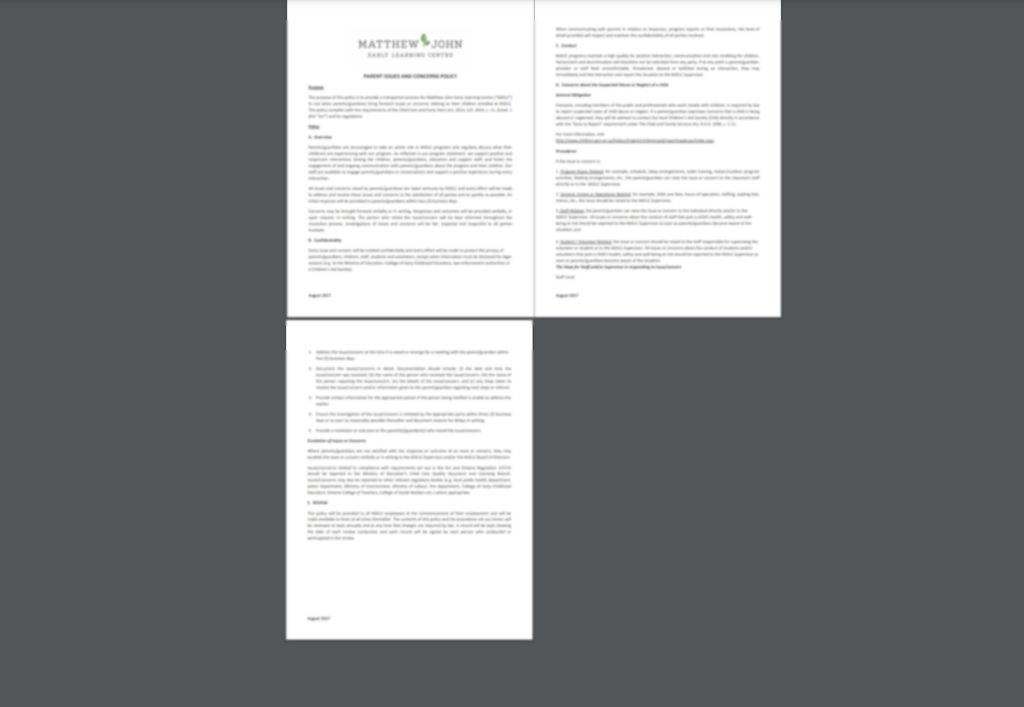
The Parents Issues and Concerns Policy and Procedure template highlights the general and peculiar issues that parents or guardians regularly take active roles in discussing with their employees.
It covers what the child is experiencing, how the parents communicate, the effect it has on the program, and the support the parents get.
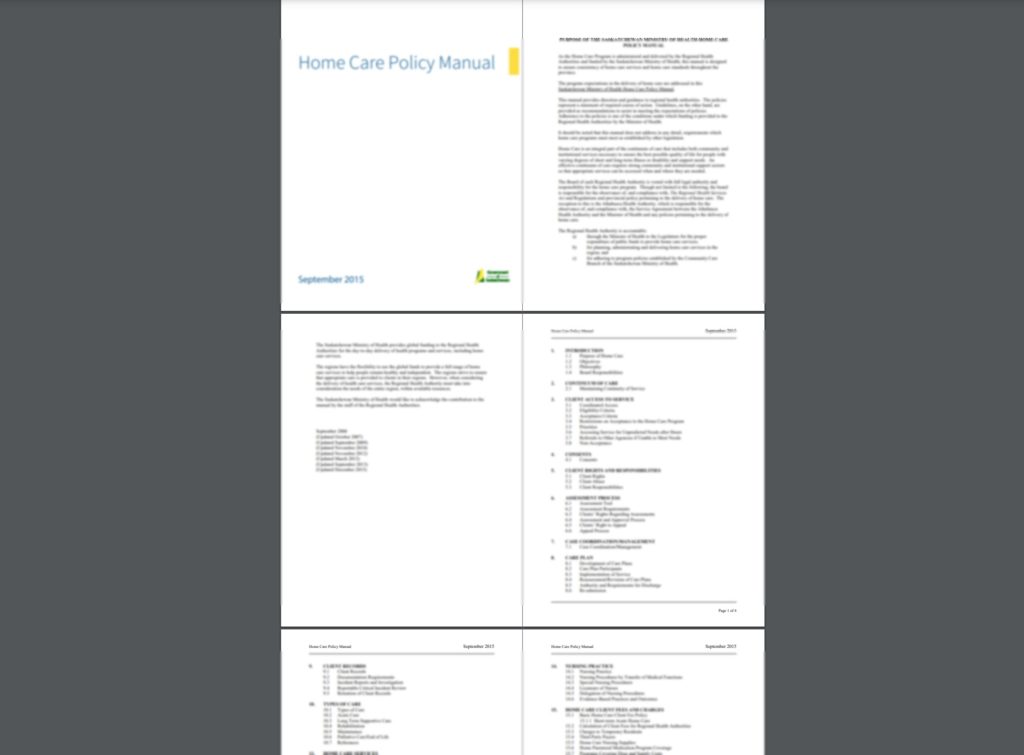
The Home Care Policy and Procedure template highlights both the community and institutional services needed to provide quality of life for people. This varies from short- and long-term illness or disability and support needs.
This template can be adapted easily and requires a strong community and institutional support sectors to appropriate services whenever it’s needed.
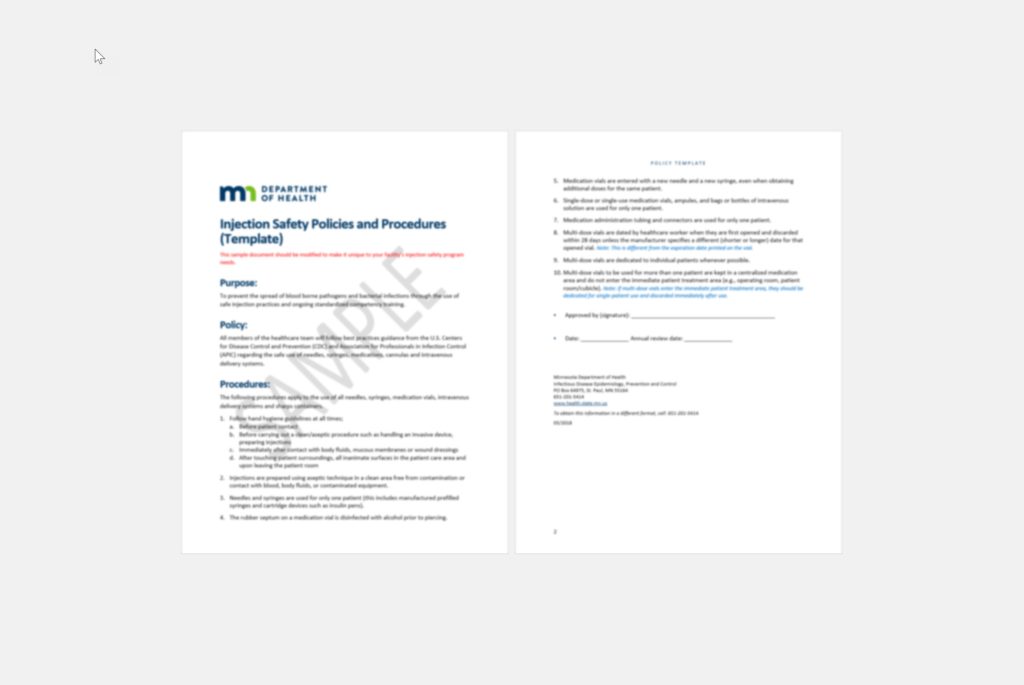
The Injection Safety Policy and Procedure template ensures the proper disposal of used injection and presents preventive actions to continued risk of infection and an environmental hazard to individuals and local communities.
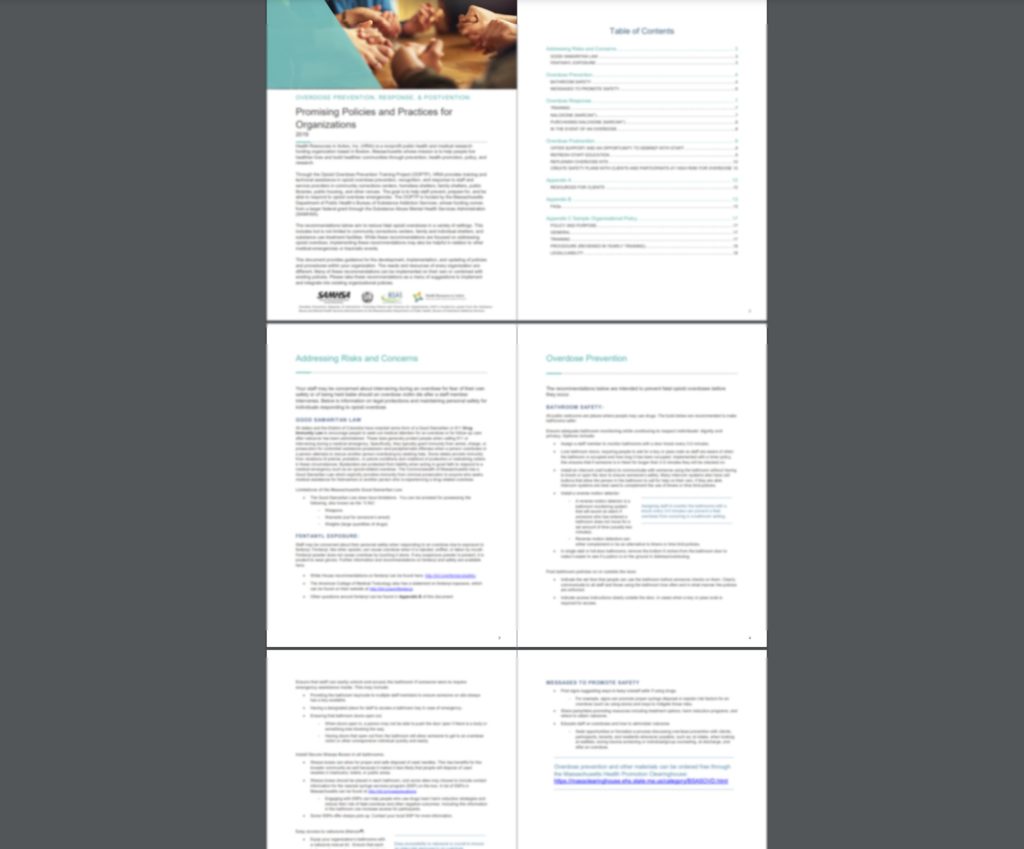
The Overdose Prevention Policy and Procedure template directs physicians, physician assistants, or nurse practitioners to oversee the clinical aspects of opioid overdose prevention.
It entails how to identify and select a trained overdose responder, how to ensure they’re trained, and how to develop the training curriculum.
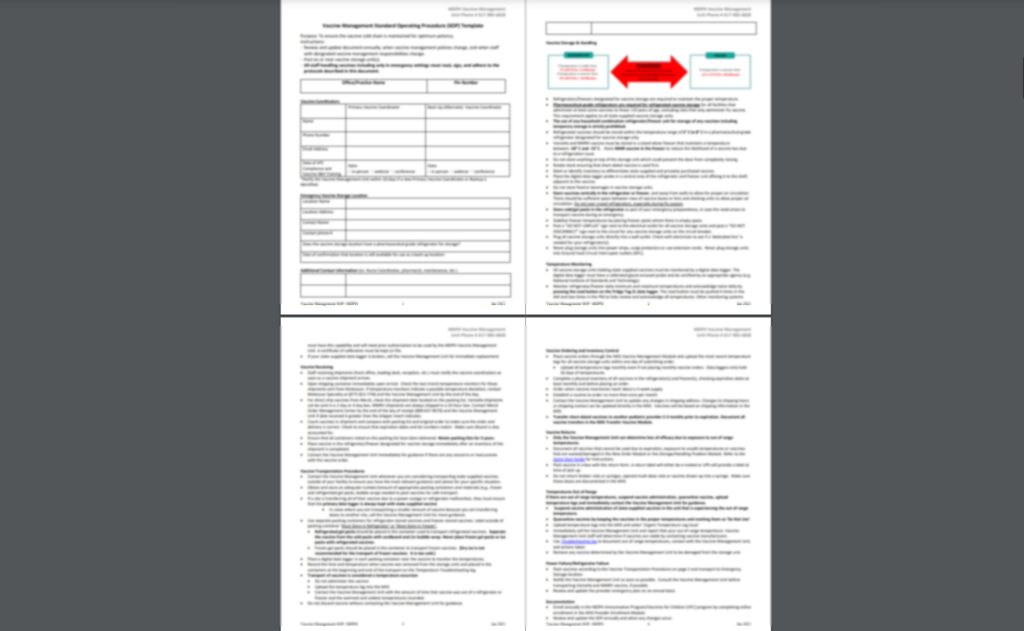
The Vaccine Maintenance Policy and Procedure template ensures that vaccines are handled according to standards to maintain its potency. It also encourages the effective use of vaccines to improve immunity against disease.
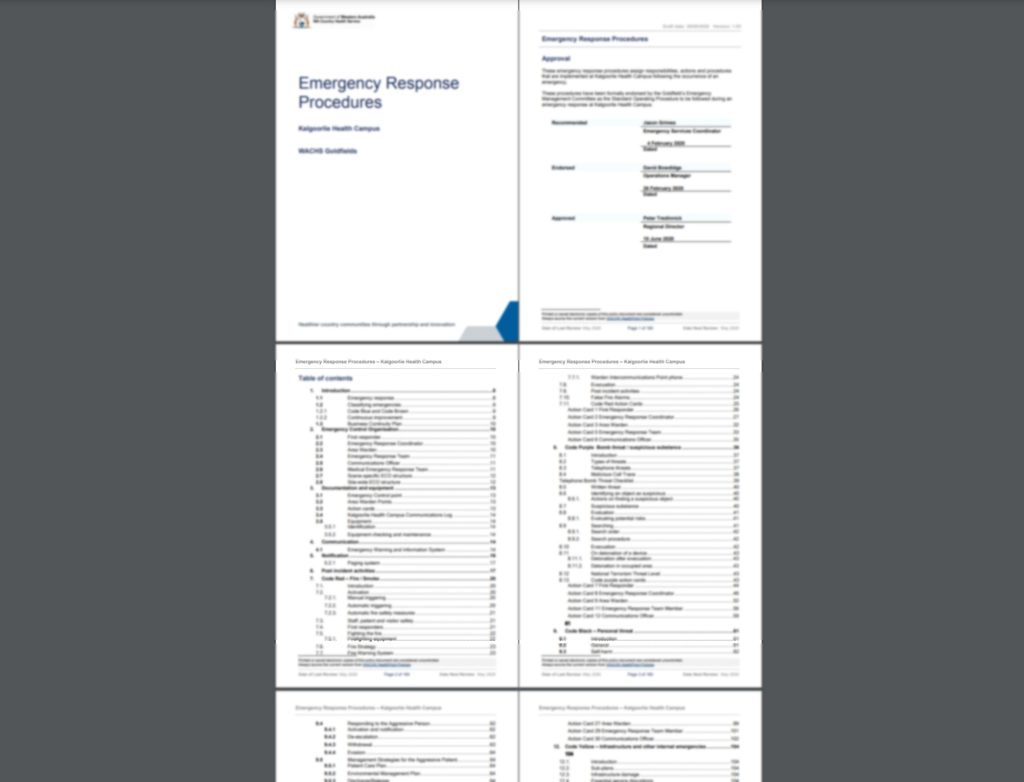
The Managing Medical Emergencies Policy and Procedure template highlights how to call for help in an emergency situation.
They comprise the priority call which is 9-1-1 if severe illness or injury is possibly life-threatening. It also takes it further to the second priority call for contacting first responders, supervisors, or other employees who are first aid/CPR trained.
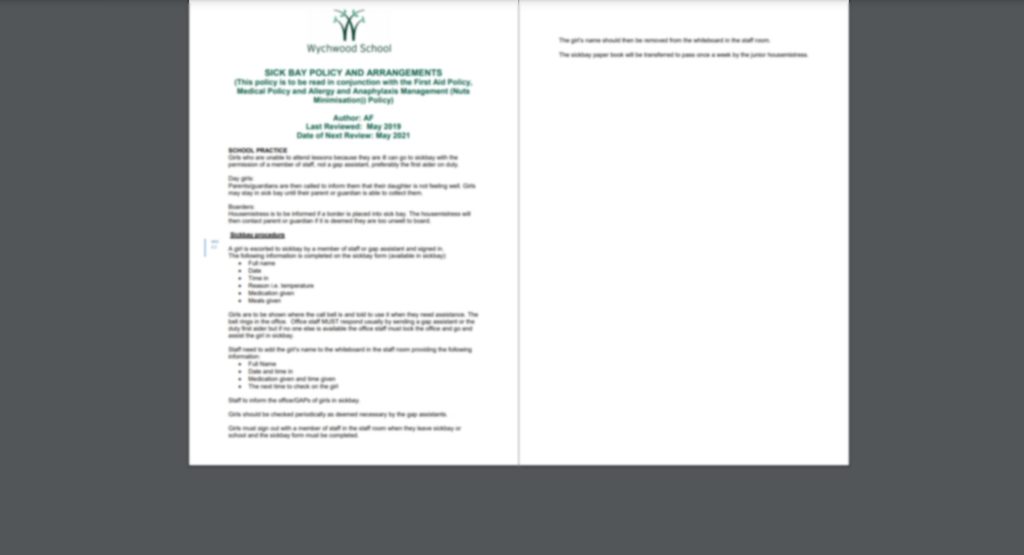
The Sick Bay Policy and Procedure template applies to the educational environment. It guides teachers on how to manage general or emergency situations of unwell students.
It records the date and time a child arrives at the sickbay, the illness description, how it’s been treated, the contacted parents and details of the phone conversation, and the outcome or description of the results.

The Livestock Transport Policy and Procedure template protects the life and value of food animals when they’re being transported for commercial agriculture purposes.
The document entails the transportation of animals by ensuring how they are transported, for instance, by road, motor vehicle, rail, ship, and air. It also ensures that they’re cared for throughout the journey to avoid stress, bruises, suffocation, etc.
The finance-related policy and procedure templates are documents ranging from grant management, anti-money laundering, payment security, billing services, etc.
The templates in this section include:
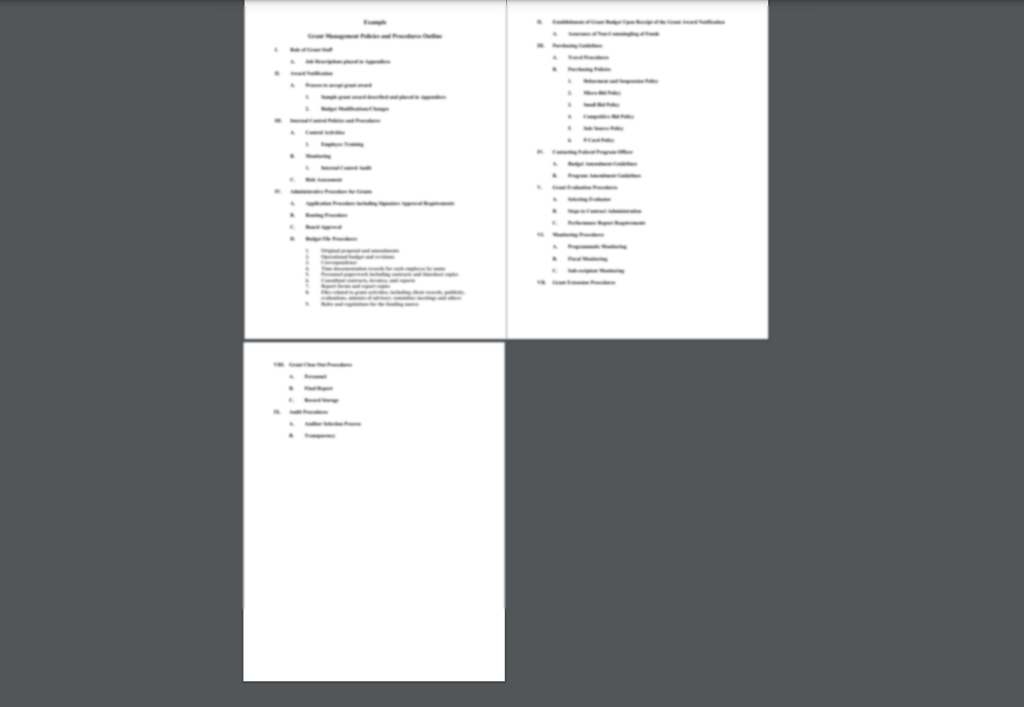
Grant Management Policy and Procedure templates are for businesses or nonprofits that want to access global opportunities.
The template lets you oversee the financial and program administration of grants. It takes a comprehensive approach to grant management from grant sourcing, the language, and storytelling, products or services to pitch in the application, etc.
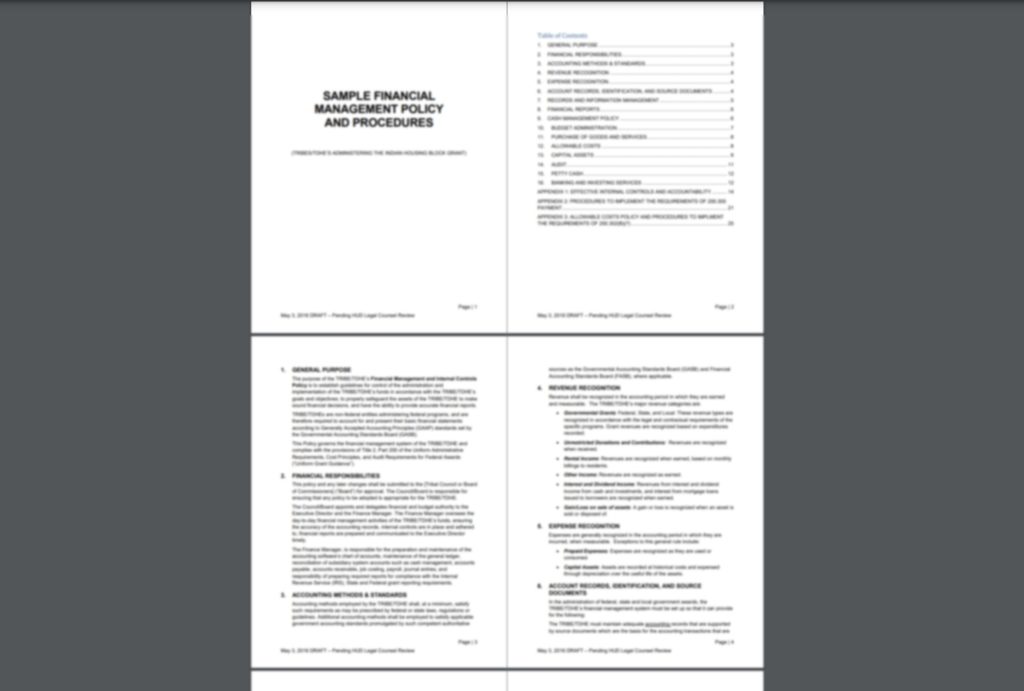
The Financial Program Management and Control Policy and Procedures template highlights the management cores like the administrative, accounting and finance, internal control, risk reduction, and office administration.
With it, your organization will be able to make policies that guide the interest of the organization. This could be incorporated with the state bylaws, audit committee, etc.
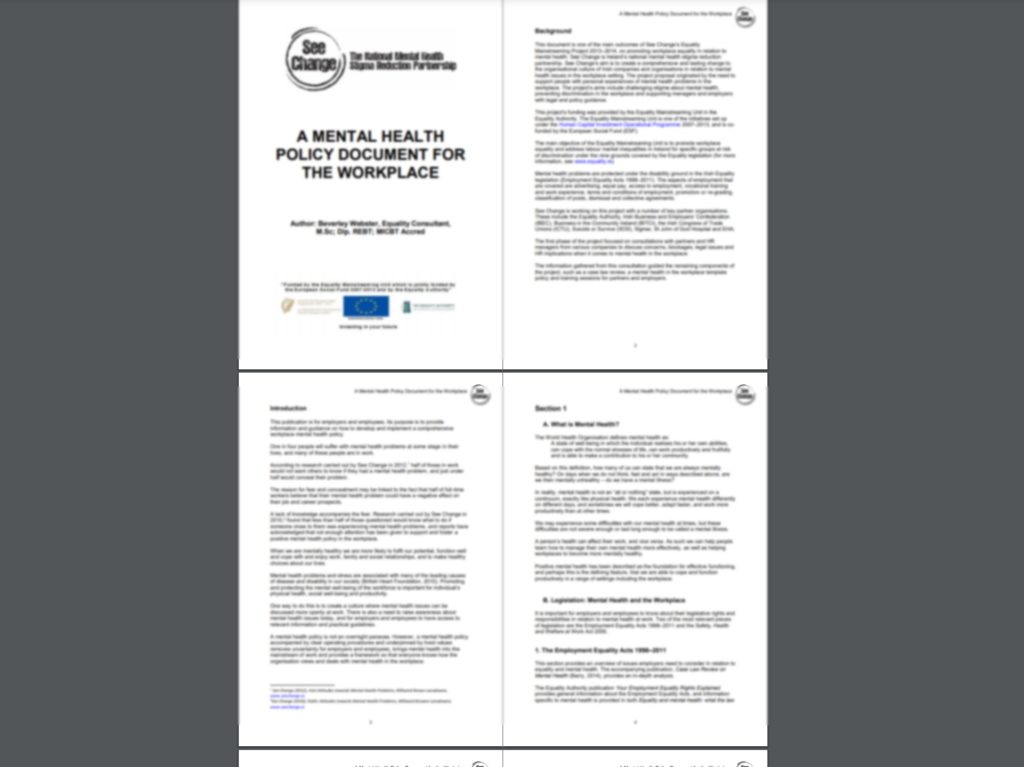
The Employee Mental Health Policy and Procedure template promotes positive mental health in the workplace. It erases discrimination, stigmatization, social exclusion, and workload in the workplace.
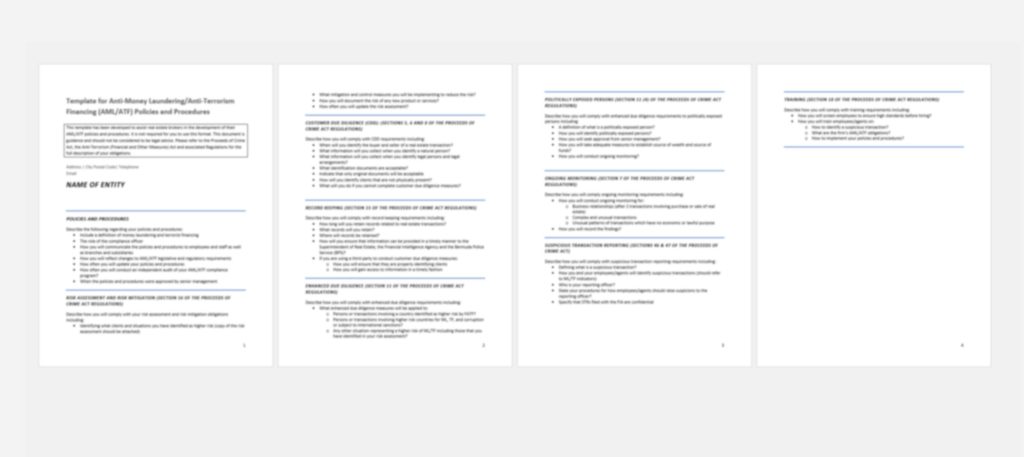
The Anti-money Laundering Policy and Procedure template will help your organization to adopt the best practices of anti-money laundering. It includes anti-fraud, anti-corruption, and taking measures to mitigate against financial crime.
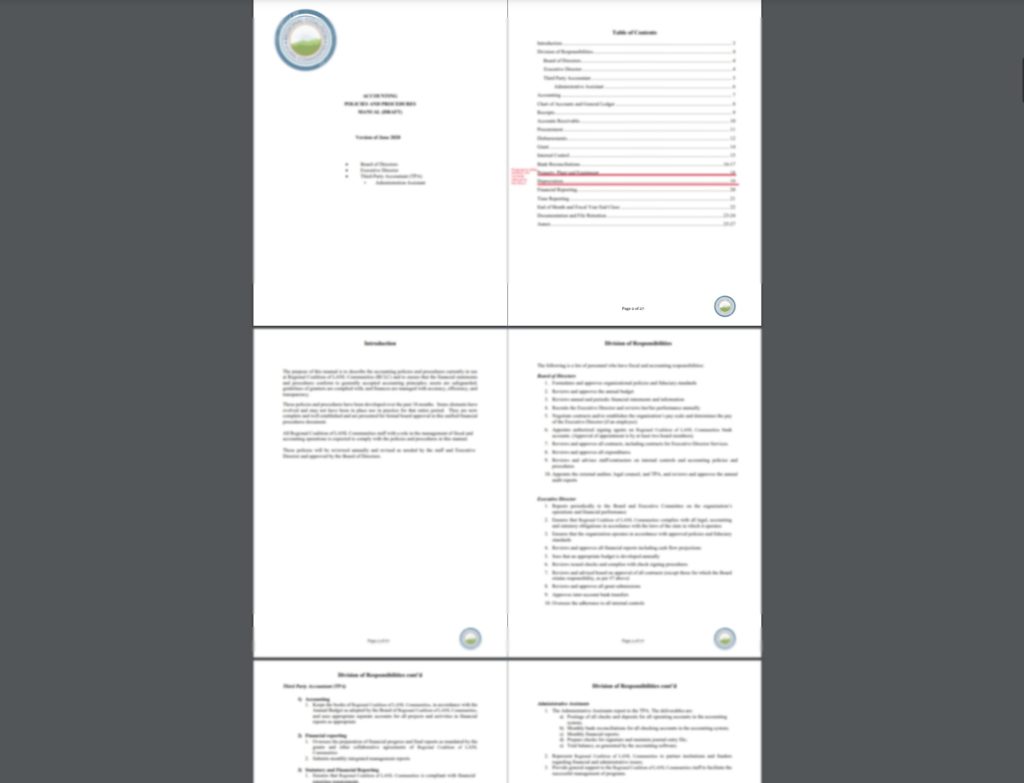
The Accounting Policy and Procedure template can be used by small, medium, and larger enterprises.
It contains the financial framework to satisfy auditors, obtain accreditations, certifications and satisfy boards looking for higher standards of strategic governance and administration in your company.
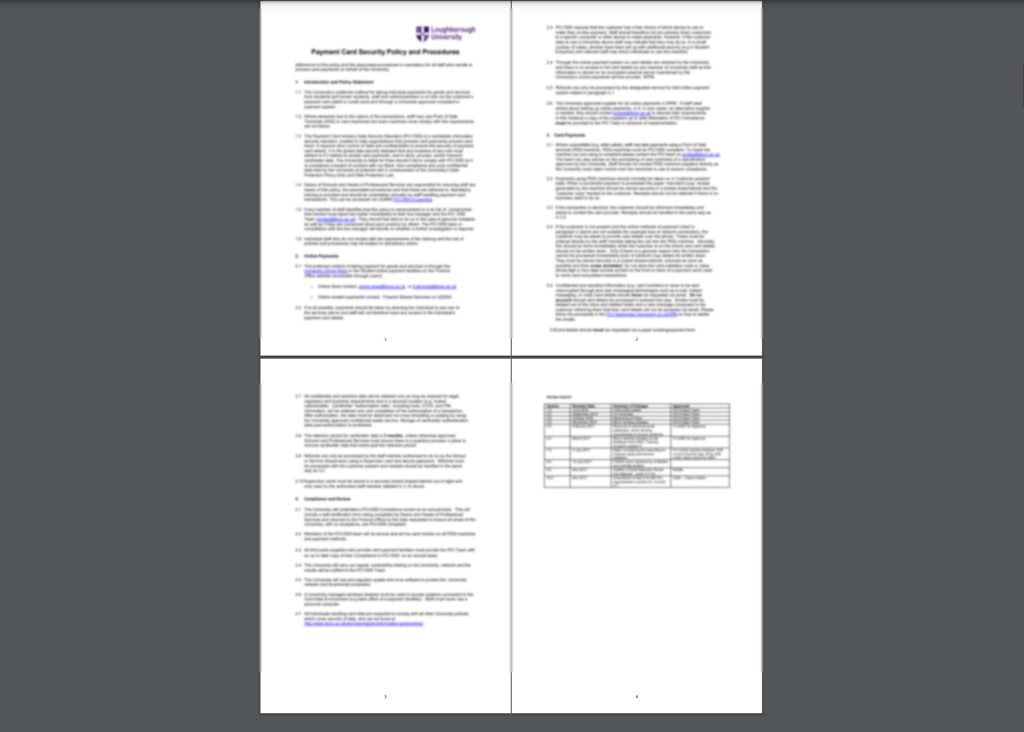
The Payment Security Policy and Procedure template is created to help organizations processing card payments to prevent card fraud. It includes verticals that put strict control of data and confidentiality on card payment details.
For instance, it pushes for a global data security standard that businesses can adopt to accept card payments, and to store, process, and transmit cardholder data.
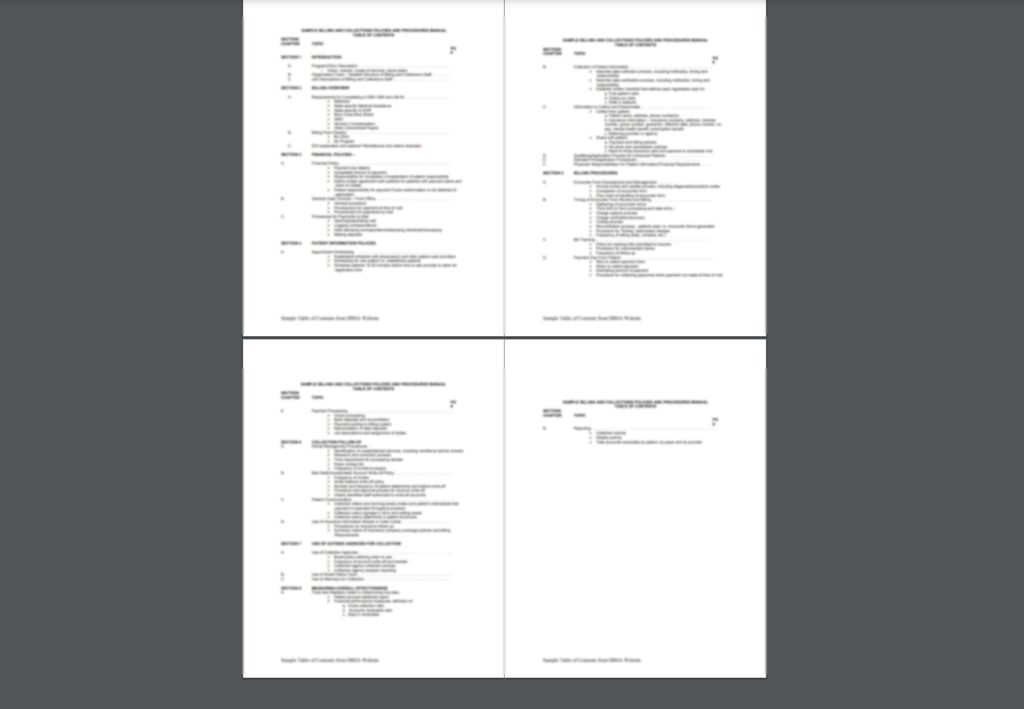
The Billing Services Policy and Procedure template ensures that your organization’s billing process meets the industry’s compliances.
It involves the process of proceeding with the compliance team, how to take stock of a broad aspect of information, and regulations to cater to administrative responsibilities.
It also relates to guidelines that control the day-to-day activities of service billings between companies and their customers.
The security-related policy and procedure templates are documents ranging from firewall configuration security, information security, internet, and intranet security, data protection, etc.
The templates in this section include:
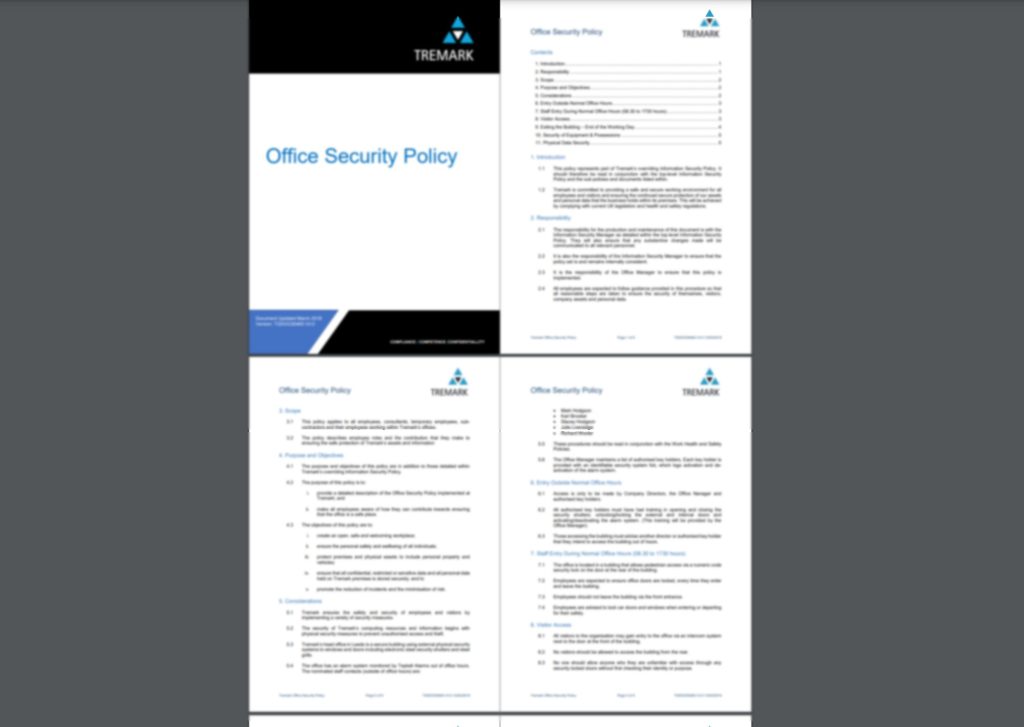
This Office Security Policy and Procedure template outlines basic security rules, guidelines, and definitions that are standardized across the entire organization. It outlines the importance of wearing ID badges at all times and information about how to make an acceptable password.
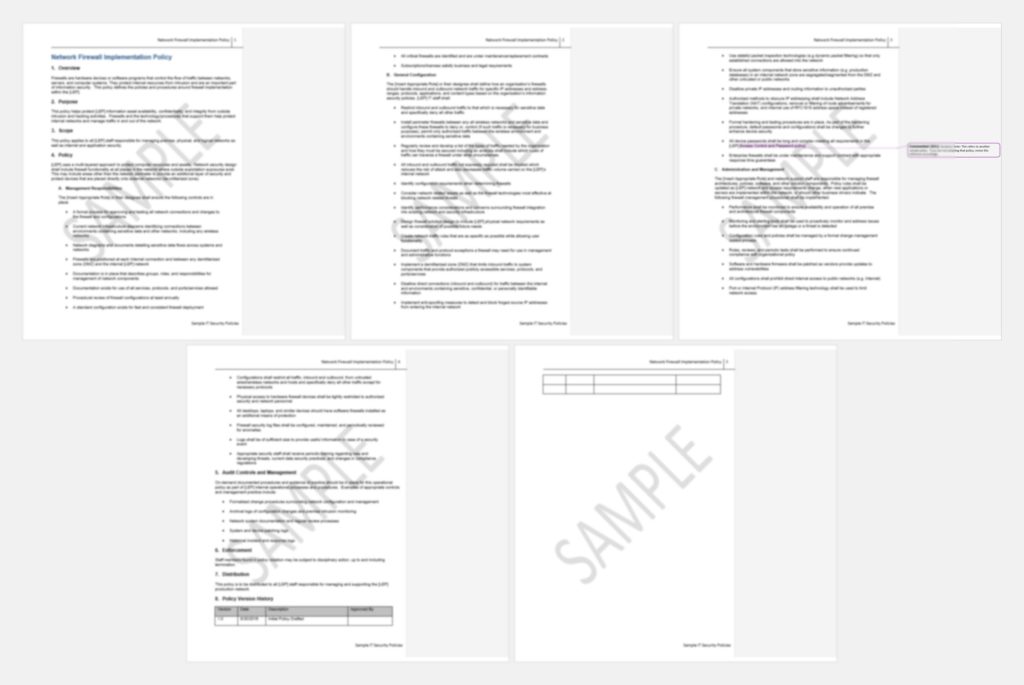
The Firewall Configuration Security Policy and Procedure template provides the essential guidelines for the information systems security infrastructure.
It itemizes how to control security systems and restrict network connectivity on network services. It also defines the rules of managing and maintaining owned, rented, or leased firewalls as controlled by the company.
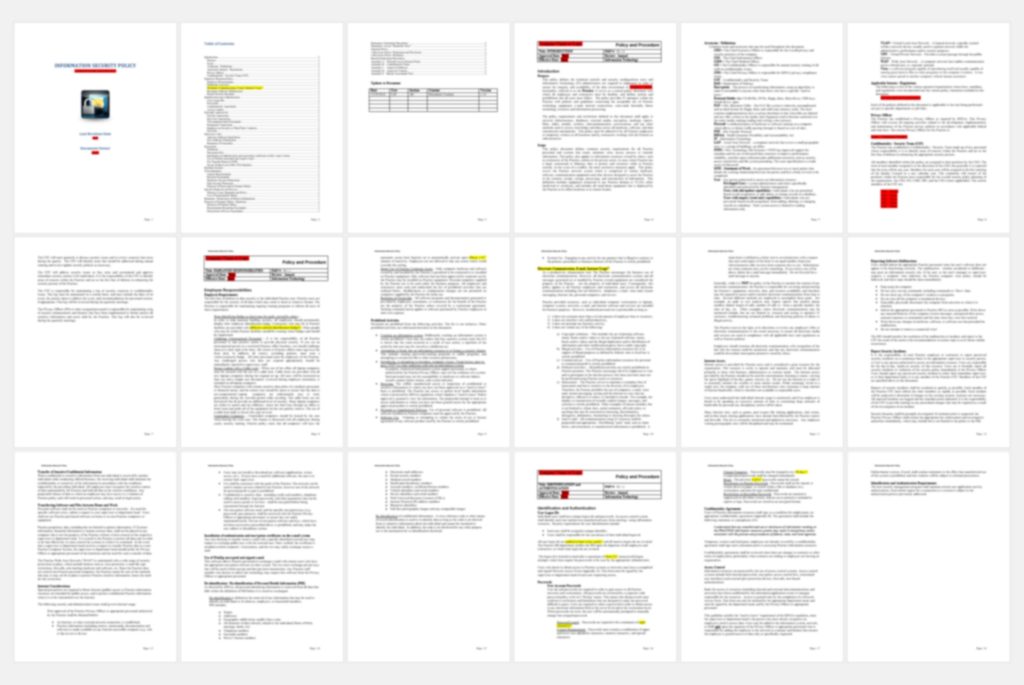
The Information Security Policy and Procedure template outlines the requirements around which encryption algorithms define the acceptable use of equipment and computing services that the organization subscribes to. It also includes employee information, security measures to protect the organization’s corporate resources, and proprietary information.
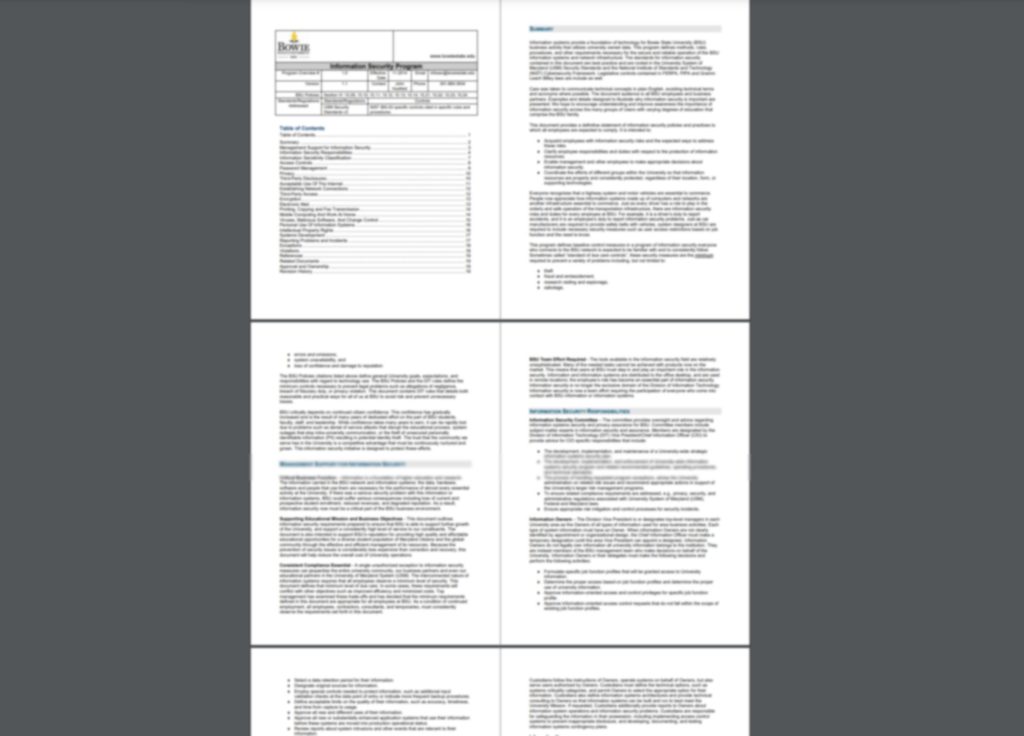
The Intranet and Internet Security Policy and Procedure template requests to capture those who can access the internet through the company’s computing or networking resources and then expects them to comply with the policy. So, employees are expected to have a good knowledge of internet services; else, they may lose their system privileges.
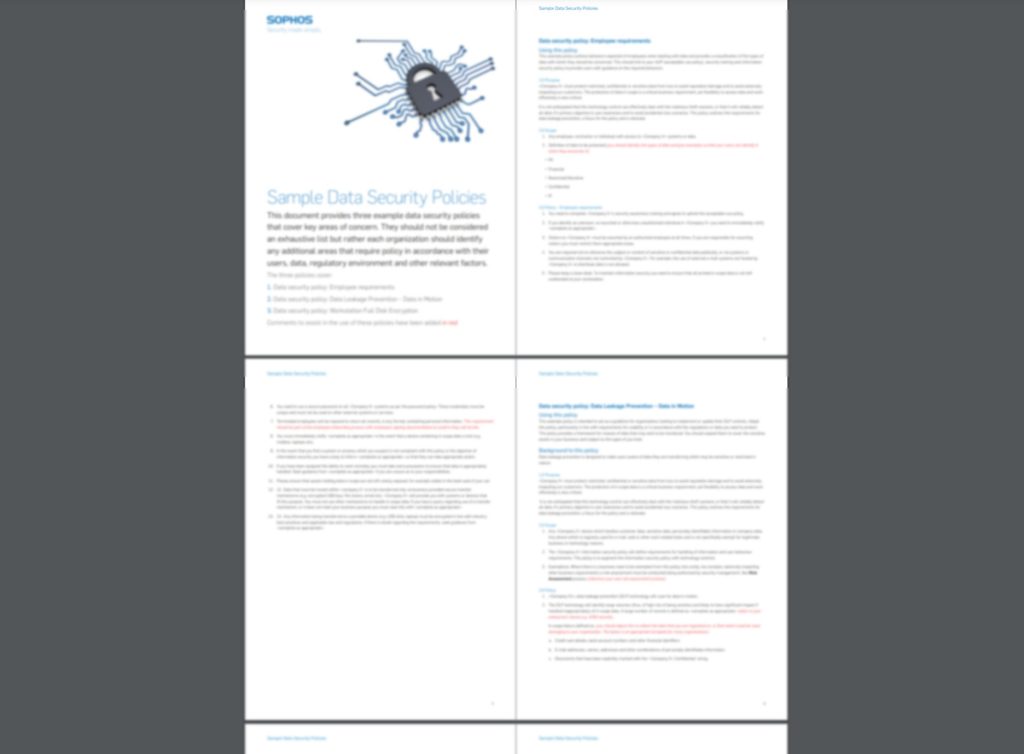
The Data Protection, Confidentiality, and Information Services Policy and Procedure template address data encryption, password protection, compliance requirements, and access control.
It also highlights the data protection process and explains the roles and functions of the data protection process.
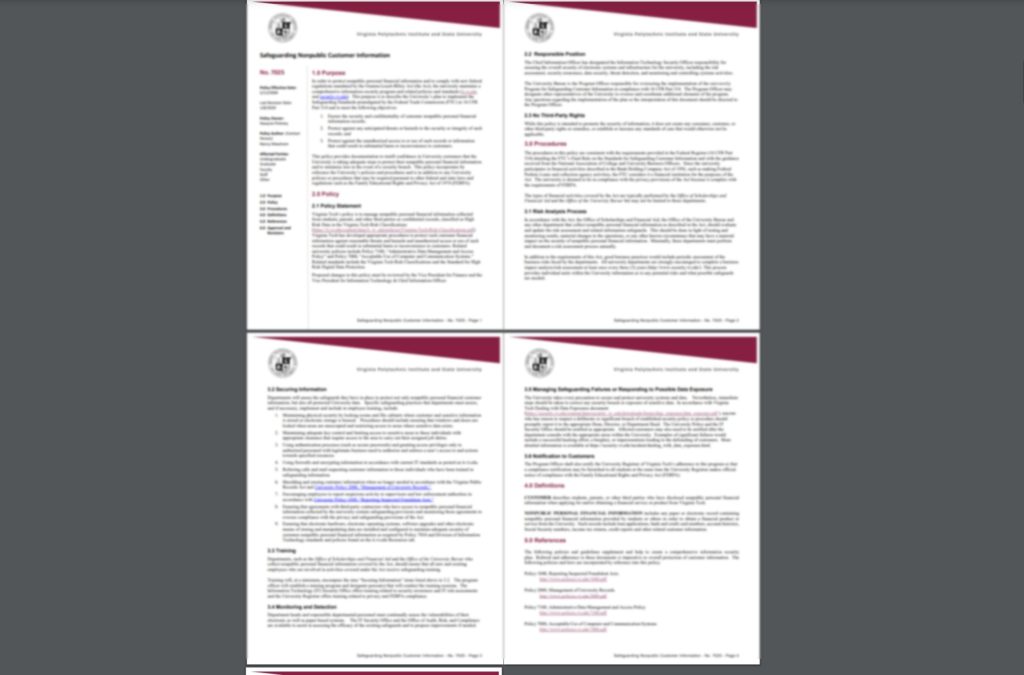
The Safeguarding Customer Information Policy and Procedure template outlines the behavioral expectations of employees when dealing with the customer.
It outlines employer’s awareness of customer data and leads them to avoid accidental loss scenarios. This policy also includes the requirements for data leakage prevention and protects restricted, confidential, and sensitive customer data.

A policy in an organization is a clearly defined, easy-to-understand statement that directs how the organization operates. They are guiding rules that every staff member should follow when delivering their assigned responsibilities.
Policies are regulations that govern process delivery in the organization. Policies offer a structure for consistency and also ensure compliance with organizational values and goals as well as regulations and standards.
Meanwhile, as the name implies, the procedure describes how policies should be implemented. Procedures are step-by-step instructional statements that explain how an employee should complete a task or job.
That said, the procedures document created to achieve a particular task can change over time as new tools, new processes, and new policies emerge. Usually, procedures are performed by employees and describe who should perform specific activities and how to complete a task.
Many companies have paid fines and faced unnecessary lawsuits because they lack these simple documents. For regulatory requirements, every business must have the policies and procedure documents.
This is important because it provides information that gears effective corporate compliance and requires every department to adopt the best practices to work.
It also ensures overall work experience in the areas of:
These documents ensure that the employees’ and employers’ rights are duly met with total fairness.
Sometimes, biases are expected in human nature. Employees don’t want to work according to standard but want to get handsome salaries. The policy and procedure documents are reasonable to ensure that employees stay on track and deliver on the agreed terms. It is a mechanism to hold them accountable.
The policy and procedure documents are also perfect for identifying gaps in the work process and organizational transactions. It helps to figure our compliance level and allows the audit team to ascertain if the organization is steering in the right direction or not.
The policy and procedure document also helps the organizations to build a more robust work culture. When each employee knows the work procedures and the policies guiding each of his tasks, it becomes easier to add ethical values to the organization and interact with other colleagues better.
If a policy document is not thoroughly understandable to the user or employee, then it’s worthless. A good policy and procedure document should be written in simple and straightforward language that any employee, even a new hire, can understand.
The procedure document should be well-laid out and indicate how the steps in the policy document should be delivered.
That said, a procedure document must be written in a style that stirs usability. As such, it must be action-oriented, grammatically correct, and consistent. A good procedure must have the following:

Writing a policy and procedure template doesn’t come easy. There are main steps to walk through when developing the document.
Before delving into writing a policy and procedure document, here are some things you have to do:
You can’t sum up in your head or assume that a procedure will go in a particular way. You must discuss it first with those carrying it out.
That way, you’re able to understand how a typical user passes through a procedure and gather several insights on how to better it.
It becomes easier for employees to follow a procedure when they see that their contribution is being acknowledged in the final document.
During your discourse with users, ensure that you clearly understand how the procedure is currently done and how the users think it should be better done.
If the procedure transcends between departments, make sure that everyone is in that discussion. Don’t discuss procedures in department silos.
Remember also that you can’t understand the procedures any deeper without taking notes. So using multiple formats, like text, audio, and video, ensure that you’re taking notes as much as possible.
And to avoid the users nudging you, sketch out the procedure based on your understanding before meeting with the users. This process will shape your understanding through flipped learning.
Before you begin writing, ensure that you picture your understanding of the users and leverage that to write for them.
Start with an interesting introduction that will likely keep the users reading. Label each procedure by date and department so that things don’t mix up.
Also, be clear on stating who will do what, why it’s important, and how they should do it.
What are the resources you’ll need to complete the procedure?
Know the gap you want to fill by creating the procedure. Answer the question as appropriate and remember to include tools, passwords, keycodes, technology, physical items such as pen, paper, and anything else that might be required.
Now that it’s time to document the new procedure, ensure that you use the simplest and easy-to-follow-through format.
Combine your knowledge, experience in the field, and the notes you took from your meeting with the users, then explain each process in a list. Break complex procedures into simple tasks where each item stands as a single detailed and clear instruction.
Adding other types of media to your procedure will let you explain the concept properly and keep the readers glued to the content.
So instead of writing pages full of texts, you can put a page of text into a 30-second multimedia format that paints the situation rather than texts.
Adding supporting documents, such as videos, images, audio notes, or forms that need to be completed, will make the content sticky to the readers, and they will follow each procedure to the letter.
For those knowledge-thirsty users who always want to do a deep dive, consider including links to relevant resources to improve their skills.
This resource could be an e-book, blog post, or video.
You can also decide to link related procedures together so that users can easily navigate and find the company’s procedure.
Check that the procedure solves the problem you created it for. It doesn’t have to get to the users before you spot an error.
Look through it to make sure everything is correct. This will help you save time as it will be less likely that anyone will spot errors.
Also, check with the team that the steps you’ve documented bridge the gaps in the former procedure.
Testing your procedure in a controlled environment does two things. First, it helps you check that, once more, all the steps are correctly captured.
Second, it points out whether the procedure needs some rework instead of forcing people to adopt it.
Using all the key performance indices, examine the inputs, outputs, and goals, then ensure that the right mix will produce the required success.
After your test, you should know if your procedure needs improvement or not. Whichever way, ensure that you do whatever is necessary and test again before you deploy the procedure.
If you end up making any changes and re-testing the procedure, don’t skip measuring the results anew until the procedure delivers a satisfactory outcome.
The next step is to deploy and release the procedure to the team to use it.
Ensure that everyone on the company’s list understands what the procedure is and agrees with you on why it’s important and why the changes are made.
Ensure that all the users stick to the procedure, and every challenge is carefully worked on as they surface. With constant use and adaptation, practice makes perfect.
Your policy and procedure document isn’t complete without the following:
Let your headline have a policy and procedure title, the date it’s been issued, and an identification block which could include: policy number, page number, effective date, policy approval authority, etc.
Make sure that the policy and procedure number and page number appear on all subsequent pages; the footer of each page should repeat the issuing date and the policy.
You should also let your policy and procedure have a title to avoid mix-up. Ensure that the title is carefully selected so that it is simple and clearly conveys the policy’s content.
From the introduction, every user should know what the policy will do. There should be a concise statement that explains the purpose of the policy.
After the purpose of the policy, it’s best practice to include a complete policy statement that details the important reasons why the procedure is created.
Mention who the policy and procedure apply to and the consequences for non-compliance, if applicable.
Define the common terms used in the policy.
The policy and procedure document should have a help contact that anyone can reach should they need help to understand the policy and procedure document.
This is the highest body authorizing the policy and procedure. You could possibly include the date for the next required review date.
It’s thoughtful to include information about related policies or procedures, guidelines, forms, etc. By giving these resources, you have identified with the curious users to learn more.
Also, it’s thoughtful to reference detailed policies and procedures that are recommended to carry out the intent of the policy.
Aside from crafting the policy and procedure document to communicate your vision carefully and explicitly, a good policy and procedure template must:
Every defined step in the policy and procedure template should exist for the sole purpose of achieving the aim.
A policy and procedure document is not worthy of creation if it won’t be used. Your policy and procedure must be made available and accessible to the users and those who have the authority. It could be kept in the filing cabinet, binder, or online.
As you upgrade your machine or any other part of your working process, it is important to update your policy and procedure document so that it stays current at all times. That means you should create your policy and procedure document with the flexibility to accommodate new and emerging decisions.
A good policy and procedure document must also be actionable. It should represent a consistent and logical framework to implement a particular task. It should be easily adaptable and useful for the targeted user.
Just like every other document, the policy and procedure template has its don’ts.
In the process of writing your policy and procedure document, make sure you don’t assign responsibility to a designated person. Instead, use the position. So, don’t say, “Laura;” say, “administration supervisor.”
Government or industry-specific regulations may nudge you into using some keywords—don’t let it bog you down. Use words that the document user will understand but ensure that you maintain compliance with the law.
Ensure that you don’t confuse policies, procedures, and processes. They are different types of documents that work together to guide your employee on their responsibilities.
Different organizations can benefit from a policy and procedure template irrespective of what the company does, the size, and worth. A policy and procedure document always guides the work process and ensures quality delivery.
Some of these organizations are:
Formatting your policy and procedure document entails the way the document is laid out on the page, the way it looks, and visually appeals to the user.
You must format your policy and procedure document so that the document is easy to read.
Formatting always addresses things like font selection, font size and presentation (like bold or italics), spacing, margins, alignment, columns, indentation, and lists.
The visual appeal of your policy and procedure document will affect the reader and how they digest the information.
The information will be more accessible to the user by creating and labeling sections (headings), highlighting keywords or ideas (bold, italics, or lists), and making a good impression (professional look and feel, appropriate font choice for the document type).
The right way to format a policy and procedure document is to ensure that you leave a lot of white space. This will make information easy to locate and psychologically affords the user with ease of assimilation.
When your document is well structured, it makes it simple for a user to quickly focus on the aspect of policy or procedure relevant to their decision/task at hand.
It is also important that you use a flexible, modular outline as this will make the document seamless to modify for new updates. And your use of labels while introducing key points should be consistent across the entire document.
That said, ensure that you carefully spell out your use of acronyms to avoid ambiguity. Also, make sure that your use of words is not too technical—it should be simple enough for a new employee to understand.
Policy, procedure, and process relate in many ways:
However, policy, procedure, and process differ greatly in many ways. The table below summarizes it.
| Policy | Procedure | Process |
| A policy is how the company wants something to be done. | A procedure is about how we do something. | A process is about what we do. |
| Policies are an organization’s way of tackling the problem. | Procedures are step-by-step ways of doing a job or carrying out a task. | A process is a set of interrelated or interacting activities which transform inputs into outputs. |
| Policy is at the top level of the workplace pyramid. | Procedure is at the third level of the workplace pyramid. | Process is at the second level of the workplace pyramid. |
| Policies are guides to think for decision-making. | Procedure is a guide to actions. | Process entails how a goal or task will be achieved. |
| Policies are derived from the objectives of the company. | Procedure is required for the implementation of policy. Procedures are less rigid. | Process is a road map to completing a task. |
| Policies are more rigid and are expressed in general terms. | Procedures are flexible and expressed in specific terms. | Process is the high-level view or the mapping of a task. |
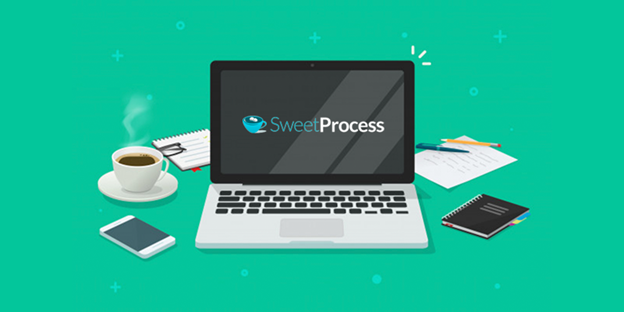
When using SweetProcess, you can create, document, and manage your company’s policy and procedure templates.
If you have repetitive tasks and want to ensure that each member of your team performs them diligently, you can document the procedure for completing each of these tasks using SweetProcess. That way, they’ll know exactly what to do, when to do it, and how to do it, even with little or no supervision.
For example, Forensic Analytical Consulting Services was using PDF files to document SOPs. This was difficult for the company to manage, and the team members kept bombarding the director of operations whenever they had any questions.
By documenting their procedures with SweetProcess, they were able to solve this dependency issue. Now, team members no longer have to contact the director of operations before finding the specific information they need.
Similarly, if you plan to create, share, and ensure the correct use of your company’s policies, you can do so using SweetProcess. This ensures that everyone in your organization is on the same page and the templates you have created are implemented as needed.
Take, for instance, Ginkgo Residential, which had a knowledge gap challenge in their company. This affected them negatively as employees were either not working as expected or making costly mistakes that affected their customers.
By using SweetProcess, they were able to put together existing procedures and made it easy for employees to access them. Now they’re able to hold employees accountable to perform their tasks diligently. Not only that, they have a structure that everyone follows religiously to complete each task.
You can get started with a 14-day free trial of SweetProcess to create and manage your company’s policy and procedure templates.
Excellent organizational structure is an indicator of a successful company. This is because a company with structure will be devoid of chaos. Employee- employer’s interaction and understanding will be top-notch.
Policy and procedure templates help organizations to manage legal risk, and it highlights the benefits and opportunities it can provide its employees, which will serve as a motivation to retain workers and help them attain job satisfaction.
Want to know the policy and procedure templates to use for your organization? Click here to download the templates relevant to your industry.